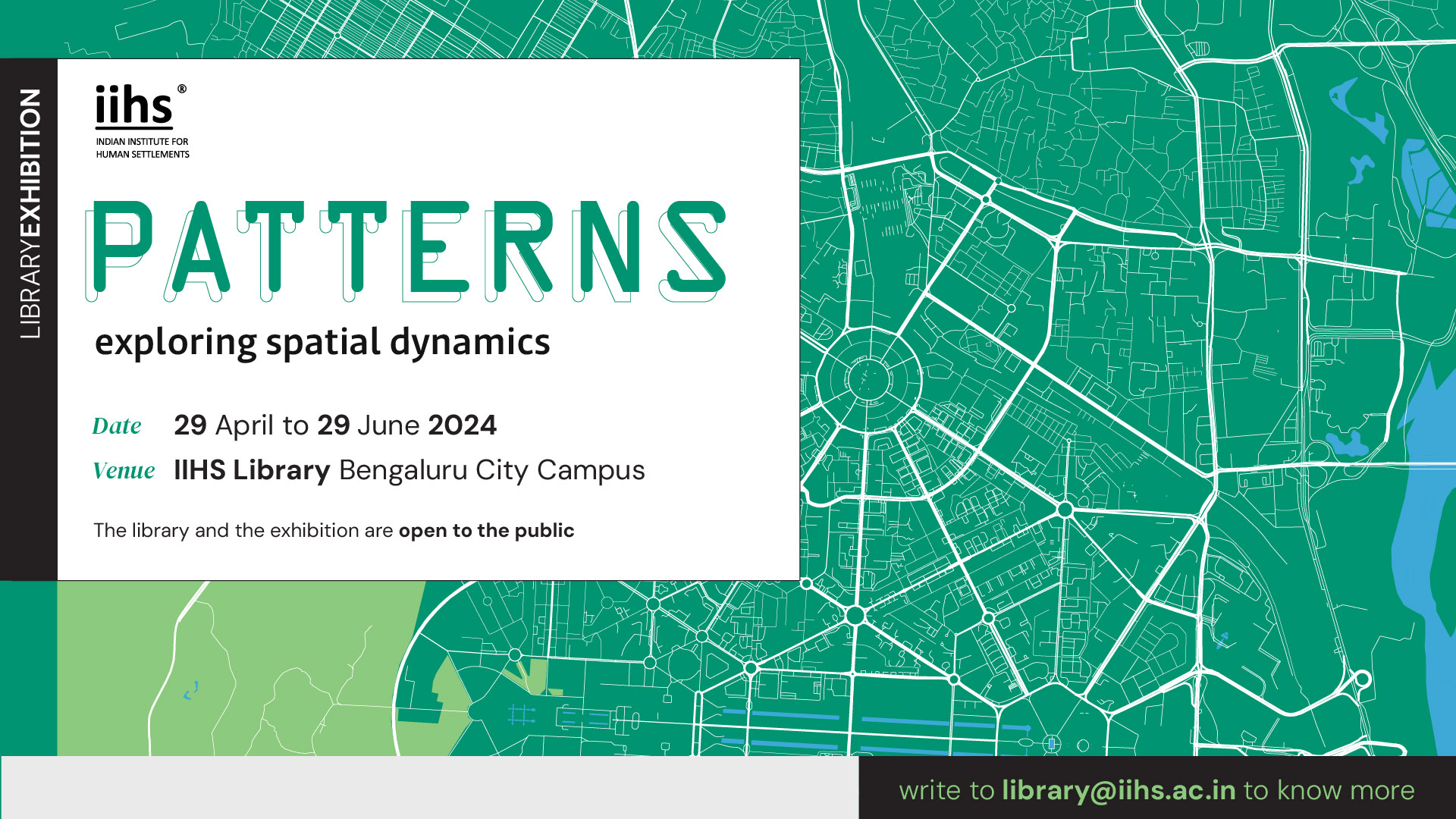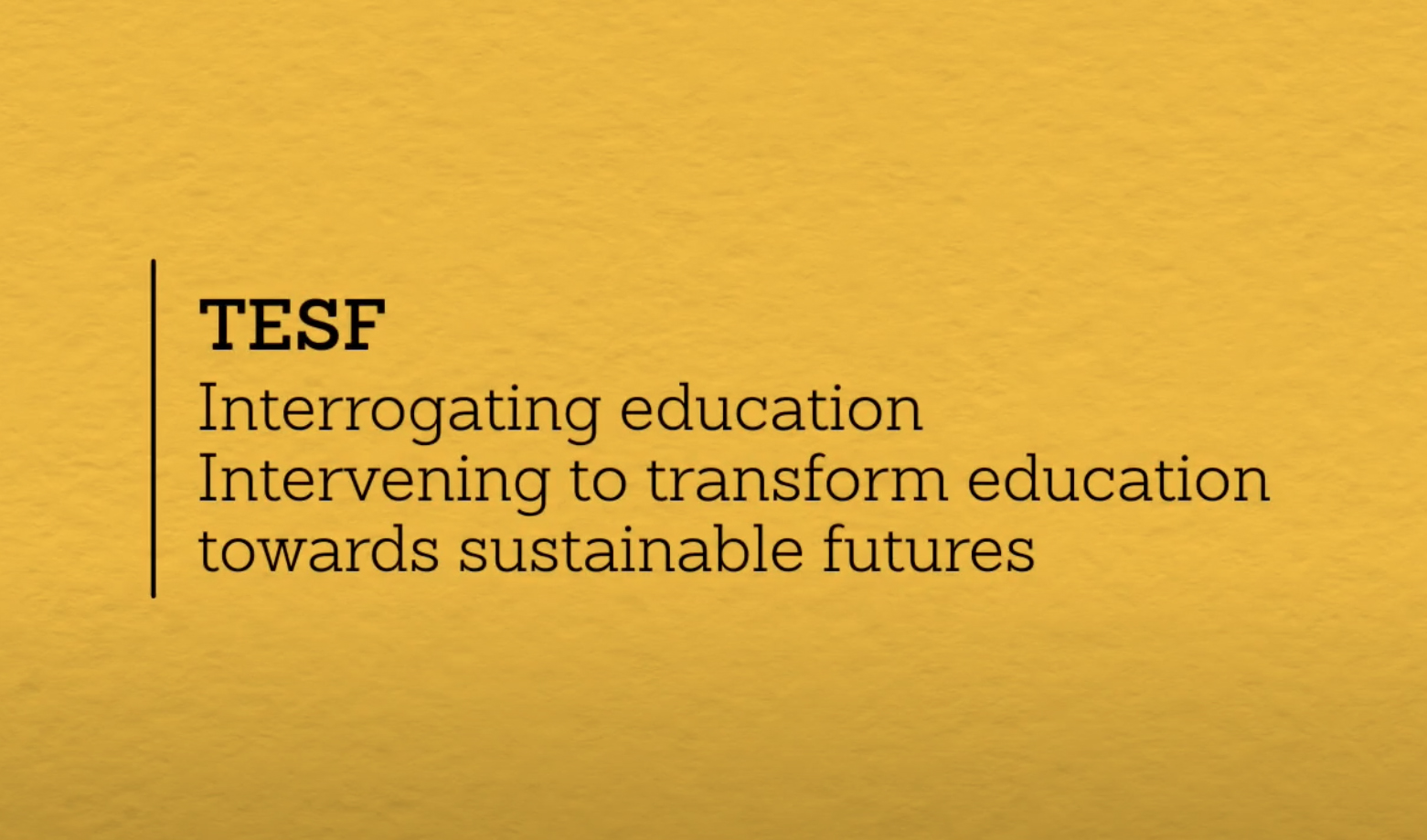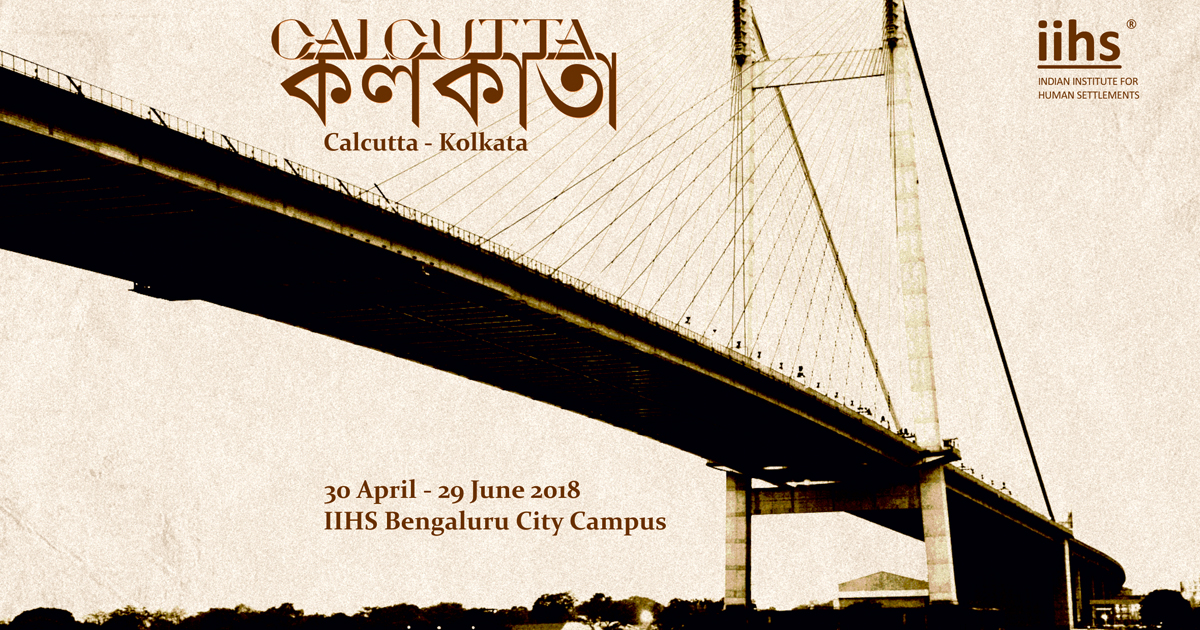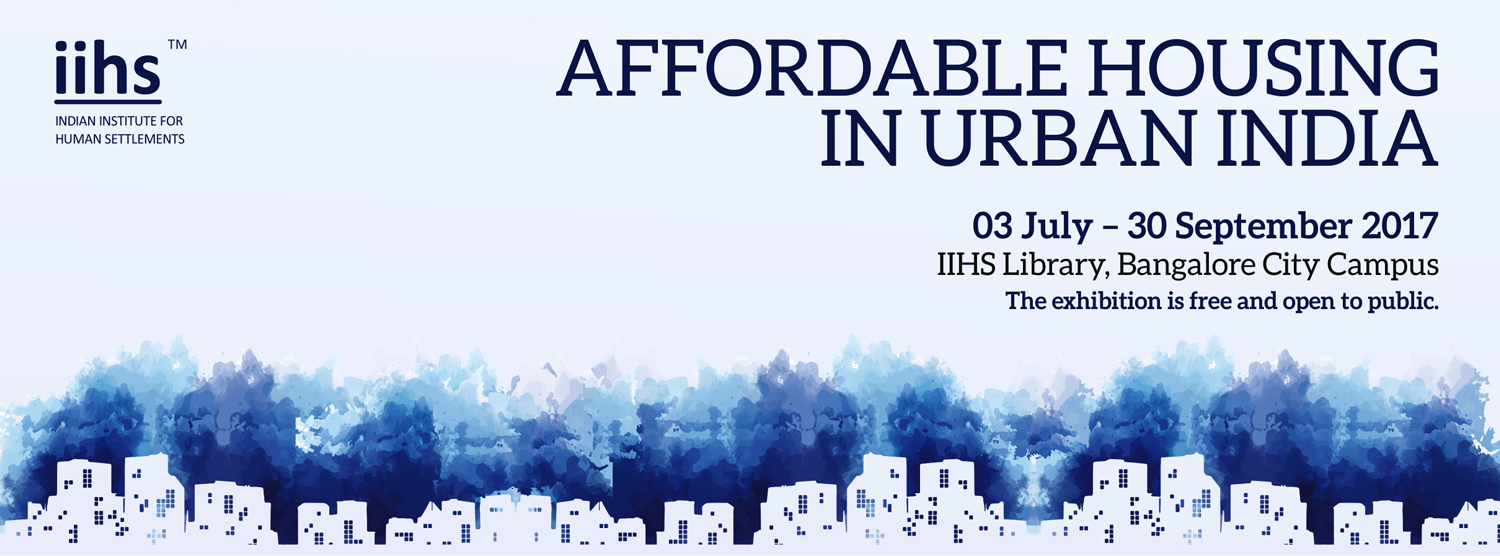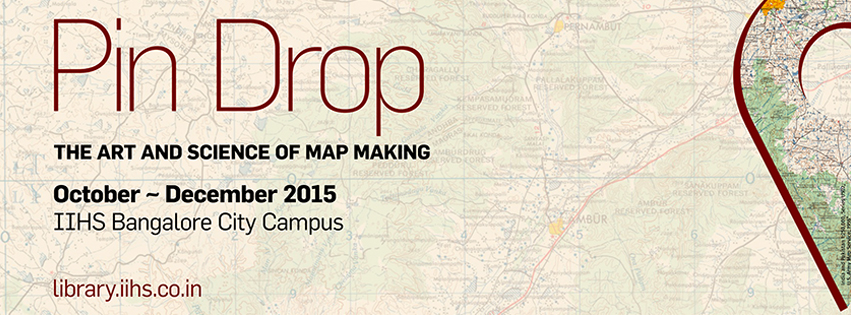Exhibitions
You are here: Home > News & Events > Exhibitions
IIHS Library showcases a series of quarterly exhibitions that focus on a particular city or theme. These exhibitions include books, maps, and movies, and they feature themes ranging from art and heritage in Indian cities, sustainable design, water and resource management, graphic novels, political history to life sciences and the urban practitioner. For the list of the past exhibitions, see below.
Upcoming and Current Exhibitions
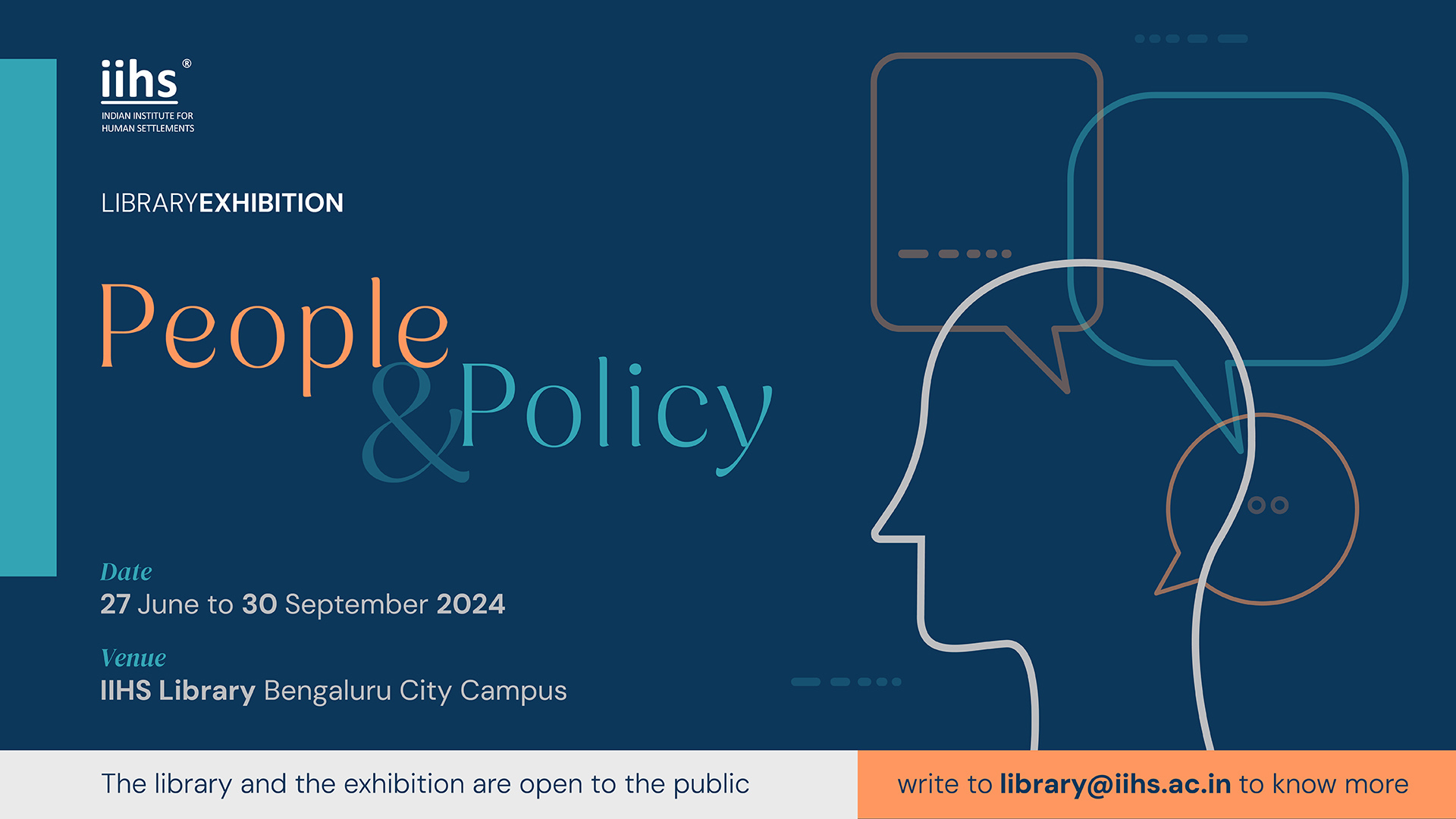
People and Policy
27 June to 30 September 2024 | IIHS Library, Bengaluru City Campus
Understanding human behaviour at an individual level and its impact on institutions and society is crucial to the design of effective interventions at scale. While humans are presumed to be rational beings, behavioural science argues that human thinking is rather biased, employing several shortcuts, mental models, and social and cultural norms.
The current Library Exhibition, curated for the IIHS Capacity Development Forum (CDF) 2024, focuses on “Capacity Development and Behavioural Insights – Implications for Institutional Design and Public Policy.” The collection showcases key works that have integrated behavioral science into institutional design and public policy.
Curated by
Abhinav M, Anuttama Dasgupta, Smitha N, from the IIHS Urban Practitioners’ Programme; and the IIHS Library Team
People & Policy Books List – Library Exhibition
| 1 | Adapting institutions : governance, complexity, and social-ecological resilience / edited by Emily Boyd, Carl Folke. | 24 | Predictably irrational : the hidden forces that shape our decisions / Dan Ariely. |
| 2 | An everyone culture : becoming a deliberately developmental organization / Robert Kegan and Lisa Laskow Lahey; with Matthew L. Miller, Andy Fleming, Deborah Helsing. | 25 | Professional service firms and politics in a global era : public policy, private expertise / edited by Chris Hurl, Anne Vogelpohl. |
| 3 | Anchoring change : seventy-five years of grassroot interventions that made a difference / edited by Vikram Singh Mehta, Neelima Khetan and Jayapadma R. V. | 26 | Public administration and public affairs / Nicholas Henry, Georgia Southern University. |
| 4 | Can we know better? : reflections for development / Robert Chambers. | 27 | Public institutions in India : performance and design / edited by Devesh Kapur and Pratap Bhanu Mehta. |
| 5 | Capacity building and development : perspectives, opportunities and challenges / edited by Jean B. Laewen. | 28 | Public policy : preferences and outcomes / Christopher A. Simon. |
| 6 | Capacity-building : an approach to people-centred development / Deborah Eade. | 29 | Public policy : a view from the South / Vishal Narain. |
| 7 | Challenging capacity building : comparative perspectives / edited by Sue Kenny and Matthew Clarke. | 30 | Public policy : concept, theory and practice / Bidyut Chakrabarty |
| 8 | Cooperation management for practitioners : managing social change with Capacity WORKS / edited by GIZ GmbH | 31 | Public policy : politics, analysis, and alternatives |
| 9 | Design thinking for training and development : creating learning journeys that get results / Sharon Boller, Laura Fletcher. | 32 | Public policy and politics in India : how institutions matter / Kuldeep Mathur. |
| 10 | Designing public policy for co-production : theory, practice and change / Catherine Durose and Liz Richardson | 33 | Reframing organizations : artistry, choice, and leadership / Lee G. Bolman, Terrence E. Deal. |
| 11 | Essentials of organizational behavior : global edition / Stephen P. Robbins, Timothy A. Judge. | 34 | Regulation in India : design, capacity, performance / Devesh Kapur and Madhav Khosla (editors). |
| 12 | How change happens / Cass R. Sunstein. | 35 | Rethinking good governance : holding to account India’s public institutions / Vinod Rai ; foreward by Pranab Mukherjee. |
| 13 | How to change the world : social entrepreneurs and the power of new ideas / David Bornstein | 36 | Scarcity : the true cost of not having enough / Sendhil Mullainathan and Eldar Shafir. |
| 14 | In service of the republic : the art and science of economic policy / Vijay Kelkar and Ajay Shah. | 37 | Systems thinking, systems practice / Peter Checkland. a 30-year retrospective |
| 15 | Indian administration / S. R. Maheshwari. | 38 | The fearless organization : creating psychological safety in the workplace for learning, innovation, and growth / Amy C. Edmondson. |
| 16 | Institutions, institutional change, and economic performance / Douglass C. North. | 39 | The fifth discipline : the art and practice of the learning organization / Peter M. Senge. |
| 17 | Leadership in public organizations : an introduction / Montgomery Van Wart with Paul Suino. | 40 | The paradox of choice : why more is less / Barry Schwartz. |
| 18 | Marconomics : defining economics through social science and consumer behavior / Ken R. Blawatt. | 41 | The power of intuition : how to use your gut feelings to make better decisions at work / Gary Klein. |
| 19 | Mindfulness in organizations : foundations, research, and applications / edited by Jochen Reb and Paul W.B. Atkins. | 42 | The public policy theory primer / Kevin B. Smith & Christopher W. Larimer. |
| 20 | Misbehaving : the making of behavioral economics / Richard H. Thaler. | 43 | The reflective practitioner : how professionals think in action / Donald A. Schön. |
| 21 | Missing in action : why should you care about public policy ? / Pranay Kotasthane and Raghu S Jaitley . | 44 | Thinking in systems : a primer / Donella H. Meadows ; edited by Diana Wright. |
| 22 | Nudge : improving decisions about health, wealth, and happiness / Richard H. Thaler & Cass R. Sunstein | 45 | Thinking, fast and slow / Daniel Kahneman. |
| 23 | Participolis : consent and contention in leoliberal urban India / edited by Karen Coelho, Lalitha Kamath and M. Vijayabaskar. | 46 | Understanding urban politics : Institutions, representation, and policies / Timothy B. Krebs |
Past Exhibitions
Patterns: exploring the spatial dynamics | 1 April 2024 to 29 June 2024
Patterns: exploring the spatial dynamics
1 April 2024 to 29 June 2024 | IIHS Library, Bengaluru City Campus
Earth’s landscapes present an intricate tapestry of patterns, woven by both human activity and natural processes. From majestic contours of mountains to delicate river networks, from myriad species assemblages to complex weather dynamics, the patterns of the natural world stand as a testament to its beauty and complexity.
Through a curated collection of maps, digital applications and books, the IIHS Geospatial Lab and Library showcase the possibilities of geospatial technology. The exhibition invites you to explore, visualise and analyse the patterns of our world at multiple scales.
Curated by
Kiran M. C., Amruth Kiran, Nirwan IIHS Geospatial Lab and IIHS Library Team
GIS Books List – Library Exhibition
| 1 | A Primer of GIS: Fundamental Geographic and Cartographic Concepts by Francis Harvey. | 14 | Principles of Remote Sensing by Paul J. Currran |
| 2 | Classics in Cartography: Reflections on Influential Articles from Cartographica edited by Martin Dodge | 15 | QGIS for Hydrological Applications: Recipes of Catchment Hydrology and Water Management by Hans van der Kwast and Kurt Menke |
| 3 | Geographic Information Analysis (2nd Edition) by David O’Sullivan and David J. Unwin | 16 | Qualitative GIS: A Mixed Methods Approach. Meghan Cope and Sarah Elwood |
| 4 | Geographic Information System for Smart Cities by T. M. Vinod Kumar | 17 | Remote Sensing and GIS in Natural Resource Management by Gouri Sankar Bhunia, Uday Chatterjee, G. K. Panda and Pravat Kumar Shit |
| 5 | Geographic Information Systems (GIS) for Disaster Management by Brian Tomaszewski | 18 | Remote Sensing and Image Interpretation (7th Edition) by Thomas M. Lillesand, Ralph W. Kiefer and Jonathan W. Chipman |
| 6 | Geographic Information Systems: Theory and Practice edited by Ram Mohan Rao and Afzal Sharieff | 19 | Rethinking Map Literacy by Ming Xie, Steven Reader and H L Vacher |
| 7 | GIS Cartography: A Guide to Effective Map Design by Gretchen N. Peterson | 20 | The Art of Map Illustration: A Step-by-Step Artistic Exploration of Contemporary Cartography and Mapmaking by James Gulliver Hancock, Hennie Haworth, Stuart Hill and Sarah King |
| 8 | Global Urban Monitoring and Assessment through Earth Observation edited by Qihao Weng | 21 | The People’s Guide to Spatial Thinking by Diana Stuart Sinton, Sarah Bednarz, Philip Gersmehl, Robert Kolvoord and David H. Uttal |
| 9 | How to Make Maps: An Introduction to Theory and Practice of Cartography by Peter Anthamatten | 22 | Urban Computing by Yu Zheng |
| 10 | Making Maps: A Visual Guide to Map Design for GIS by John Krygier and Denis Wood | 23 | Urban High-resolution Remote Sensing: Algorithms and Modeling by Guoqing Zhou |
| 11 | Map Education: A Workbook for Out-of-School Activities for Students of All Ages | 24 | Urban Planning and Development Applications of GIS by Said Easa and Yupo Chan |
| 12 | by J. S. Ahuja, M. J. S. Virk, G. T Koshie, Shrichand and A. G. Joshi | 25 | Working with Maps: A Book for Senior Secondary Level by K. K. Gupta and V. C. Tyagi |
| 13 | Principles of Map Design by Judith A. Tyner |
Cities in Fiction | 1 February 2024 to 30 March 2024
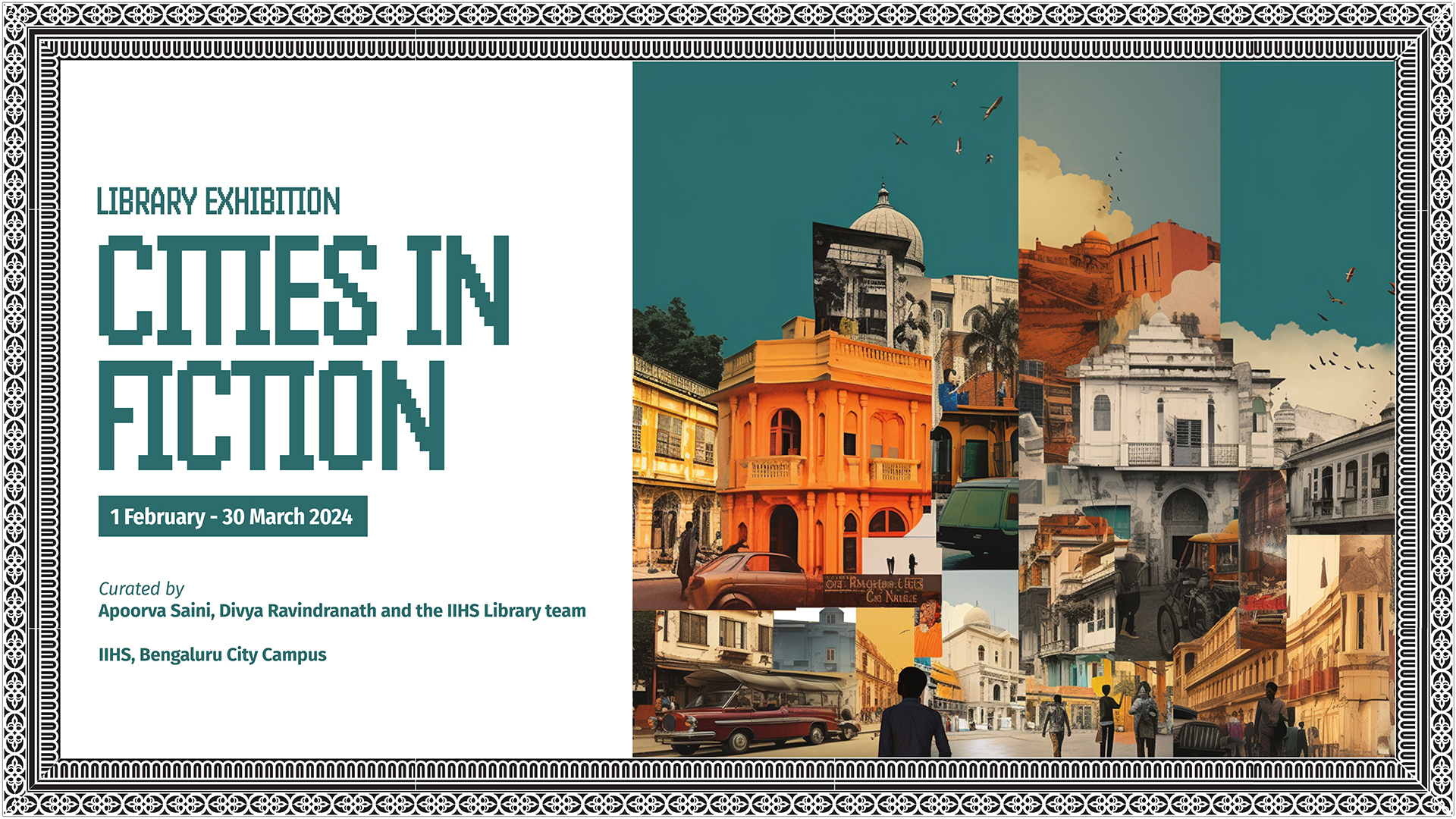 Cities in Fiction
Cities in Fiction
1 February 2024 to 30 March 2024 | IIHS Library, Bengaluru City Campus
Literature offers us an abundant wealth of real-world places—landscapes, regions, cities, towns, villages, and even no man’s land. One only needs to trace the footprints left by famous authors—Krishna Sobti’s rural Punjab in undivided India, Sri Lal Shukla’s Uttar Pradesh of misgoverned panchayats, Dehradun in Ruskin Bond’s writing, lives of Dalit Christian women in Bama’s Tamil Nadu, Nepali author Indra Bahadur Rai’s Darjeeling, Manto’s partitioned Bombay, or Lahore, to name a few. Cities in literature are record keepers of major demographic shifts, cultural, political, and archaeological transformations, urban planning, landscapes, and ecology—capturing life in its entirety.
In reality, spaces and places are never static. They are always in flux because our world is constantly being changed or rearranged. Wars, religion, development, renovation, decay, natural resources, disasters, economy, sociology and many other factors cause these fluxes. Imagination, then, becomes a powerful tool: to rebel, rebuild, remember, grieve, or celebrate. This is the incredible gift of fiction—it offers us realities which might be difficult or even impossible to live and understand otherwise. This exhibition is based on the Cities in Fiction project, through which we invite learners and educators to experiment and see ‘fiction as a method’.
To access the list of books on display, click here, and to know more, write to library@iihs.ac.in
The library and the exhibition are open to the public, and as always, your book suggestions and feedback are welcome.
Looking forward to seeing many of you at the Library.
Curated by
Apoorva Saini, Divya Ravindranath and the IIHS Library Team
List of Books
| 1 | Delhi : a soliloquy by Fathima E.V. & Nandakumar K | 34 | History’s Angel by Anjum Hasan |
| 2 | Korma, kheer and kismet : five seasons in old Delhi by Pamela Timms | 35 | Incantations over water by Sharanya Manivannan. |
| 3 | Crime fiction in the city : capital crimes by Lucy Andrew and Catherine Phelps | 36 | Khasakkinte ithihasam by O V Vijayan |
| 4 | Invisible cities by William Weaver | 37 | Leila by Prayaag Akbar by Prayaag Akbar |
| 5 | The new Asian city : three-dimensional fictions of space and urban form by Jini Kim Watson | 38 | Litanies of Dutch Battery by N.S Madhavan |
| 6 | Cobalt blue by Sachin Kundalkar | 39 | Love and Longing in Bombay by Vikram Chandra |
| 7 | My father’s garden by Hansda Sowvendra Shekhar | 40 | Lunatic in my Head by Anjum Hasan |
| 8 | The covenant of water : a novel by Abraham Verghese | 41 | Lucknow Ki Paanch Raate by Ali Sardar Jafri |
| 9 | Djinn Patrol on the Purple Line by Deepa Anappara | 42 | Lowland by Jhumpa Lahiri |
| 10 | Murder at the Mushaira by Raza Mir | 43 | Malgudi Days by R.K Narayan |
| 11 | The Adivasi Will Not Dance by Hansda Sowvendra Shekhar | 44 | Monkey Man by K.R. Usha |
| 12 | Murder under a red moon by Harini Nagendra | 45 | Mohanaswamy by Vasudhendra by Rashmi Terdal |
| 13 | The women who forgot to invent facebook and other stories by Nisha Susan | 46 | Moustache by S Harish by Jayasree Kalathil |
| 14 | Neti, neti by Anjum Hasan | 47 | Mistress by Anitha Nair |
| 15 | No presents please by Jayanta Kāykiṇi; Tejaswini Niranjana | 48 | Mumbai Balchao by Jane Borges |
| 16 | Em and the Big Hoom by Jerry Pinto | 49 | Milk Teeth by Amrita Mahale |
| 17 | Patna blues by Abdullah Khan | 50 | Mr. Majestic: The Tout Of Bengaluru by Zac O’Yeah |
| 18 | Poonachi or the story of a black goat by Perumal Murugan | 51 | Jasmine days by Benyamin |
| 19 | Reef by Romesh Gunesekera | 52 | A passage north : a novel by Anuk Arudpragasam |
| 20 | Sevasadan by Vasudha Dalmia | 53 | Age of vice by Deepti Kapoor ; map by Malik Sajad |
| 21 | Shantaram : a novel by Gregory David Roberts | 54 | Avasthe : a novel by U. R. Ananthamurthy |
| 22 | Shikari : the hunt by Yashwant Chittal | 55 | Baluta by Daya Pawar ; translated from the Marathi by Jerry Pinto. |
| 23 | Small days and nights by Tishani Doshi | 56 | Bangalore blues by Kirtana Kumar |
| 24 | The god of small things by Arundhati Roy | 57 | Black river by Nilanjana S. Roy |
| 25 | Patna blues by Abdullah Khan | 58 | Chowringhee by Sankar |
| 26 | All quiet in Vikaspuri by Sarnath Banerjee | 59 | The Bangalore Detectives Club by Harini Nagendra |
| 27 | Voices in the city by Anita Desai | 60 | The book of everlasting things : a novel by Aanchal Malhotra |
| 28 | Valli : a novel by Sheela Tomy | 61 | The Cosmopolitans by Anjum Hasan |
| 29 | Twilight in Delhi : a novel by Ahmed Ali | 62 | The far field : a novel by Madhuri Vijay |
| 30 | Flowers on the grave of caste by Yogesh Maitreya | 63 | The high priestess never marries : stories of love and consequence by Sharanya Manivannan |
| 31 | Half the night is gone by Amitabha Bagchi | 64 | The house of Kanooru by Kuvempu |
| 32 | Hangwoman by K.R. Meera | 65 | The machine is learning by Tanuj Solanki |
| 33 | Ice boys in bell bottoms by Krishna Shastri Devulapalli |
Transforming Education for Sustainable Futures | 29 October 2023 to 29 January 2024
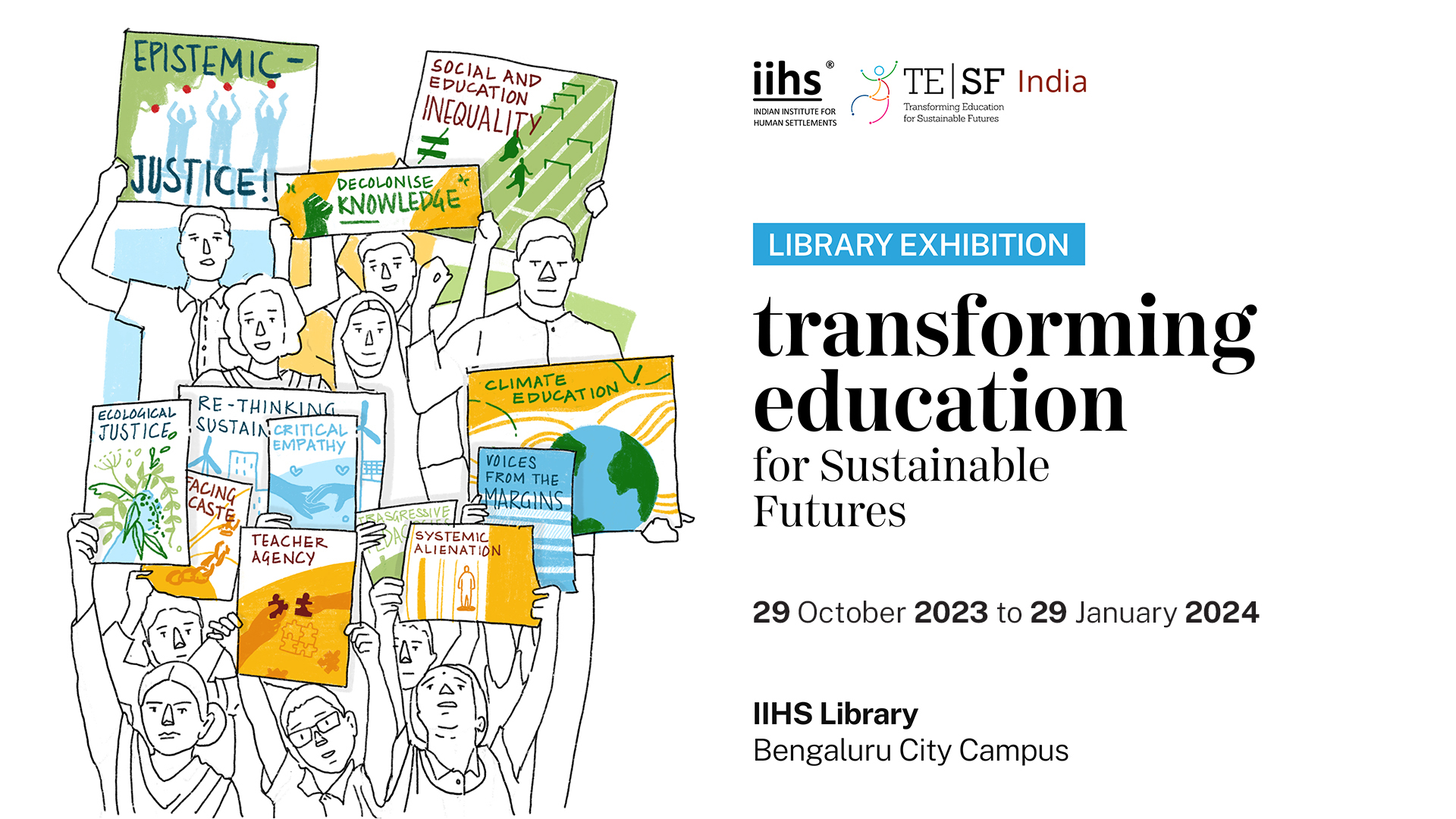
Transforming Education for Sustainable Futures
Education in India is a complex, multi-layered problematic replete with colonial legacies, neoliberal policies and heightened economic, caste, class, gender and community-based inequities. This IIHS library exhibition curated by the India hub of TESF (Transforming Education for Sustainable Futures) explores the dialectic relationship between education and sustainable development. Economic inequality and social exclusion in India have deepened over the years due to withdrawal of the welfare state, increased private interests, and concentration of wealth. As education shifts towards prioritising narrow economic self- interest over crucial public and social concerns, TESF seeks to interrogate the role education plays in the current crisis of unsustainable development; examine how education can be transformed and the role transformative education can play in creating environmentally and socially just societies. The exhibition features a collection of books, TESF India research reports and artefacts that collectively offer a comprehensive view of scholarly work examining the challenges in India’s education system while also highlighting how education can be a catalyst for social transformation towards sustainable futures.
We invite educators, researchers, teachers, practitioners and everyone who is thinking about education to visit the exhibition at the IIHS library.
To access the list of books on display at the library catalogue click here.
The library and the exhibition are open to the public. Write to library@iihs.ac.in to know more.
Curated by
TESF – India collective
TESF India Project Map
The map indicates the TESF India research sites, the cross-cutting themes addressed, and the key participants in each of the projects. It depicts the geographic spread as well as the diversity of the communities the projects engage with.
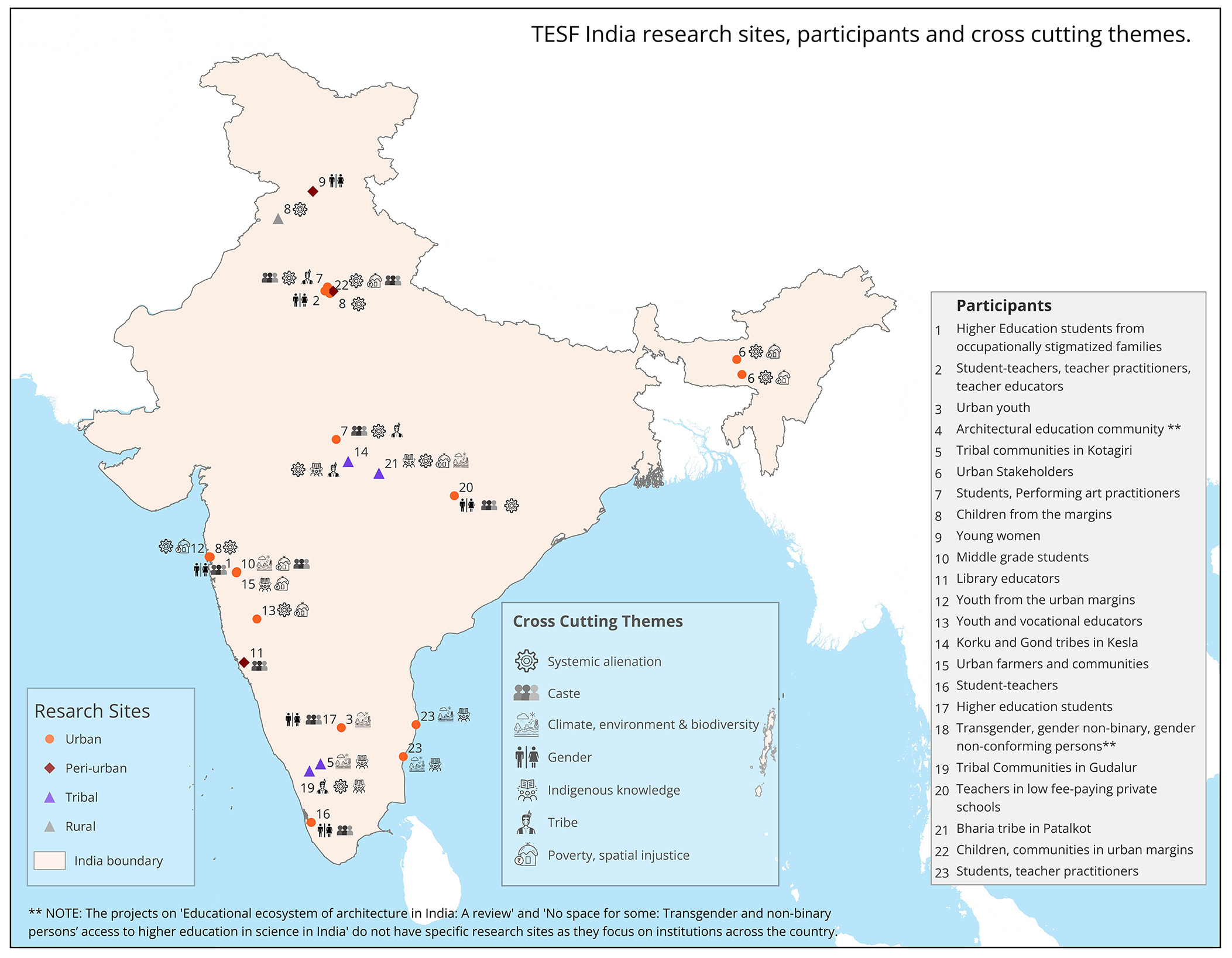
List of Books
- A half-century of Indian higher education: Essays by Philip G. Altbach
- Ambedkar’s vision and education of weaker sections edited by D. K. Verma and A. Sohrot
- Beyond learning: Democratic education for a human future by Gert J.J. Biesta
- Changing educational contexts, issues and identities: 40 Years of comparative education edited by Michael Crossley, Patricia Broadfoot and Michele Schweisfurth
- Children in the Anthropocene: Rethinking sustainability and child friendliness in cities by Karen Malone
- Critical pedagogy, ecoliteracy, and planetary crisis: The Ecopedagogy movement by Richard Kahn
- Critical realism, environmental learning and socio-ecological change edited by Leigh Price and Heila Lotz-Sisitka
- Dalit women’s education in modern India: Double discrimination by Shailaja Paik
- Decolonial imaginings: Intersectional conversations and contestations by Avtar Brah
- Decolonising schools in South Africa: The impossible dream? by Pam Christie
- Dialogue in places of learning: Youth amplified in South Africa by Adam Cooper
- Ecopedagogy: Critical environmental teaching for planetary justice and global sustainable development by Greg William Misiaszek
- Education and caste in India: The Dalit question edited by Ghanshyam Shah, Kanak Kanti Bagchi and Vishwanatha Kalaiah
- Education and development in India: Critical issues in public policy and development by Jandhyala B. G. Tilak
- Education and inequality in India: A classroom view by Manabi Majumdar and Jos Mooij
- Education and inequality: Historical and contemporary trajectories edited by Vikas Gupta, Rama Kant Agnihotri and Minati Panda
- Education and society: Themes, perspectives, practices edited by Meenakshi Thapan
- Education, knowledge and truth: Beyond the postmodern impasse edited by David Carr
- Education, teaching, and learning – discourses, cultures, and conversations: Essays in honour of Professor Krishna Kumar edited by Azra Razzack, Padma Sarangapani, and Manish Jain
- Education, unemployment, and masculinities in India by Craig Jeffrey, Patricia Jeffery and Roger Jeffery
- Educational status of scheduled tribes: Attainment and challenges by Ghanshyam Shah, K. Sujatha and Sukhadeo Thorat
- Embodiment in qualitative research by Laura L. Ellingson
- Enlightened common sense: The philosophy of critical realism by Mervyn Hartwig
- Fugitive pedagogy: Carter G. Woodson and the art of black teaching by Jarvis R. Givens
- Gender: In world perspective by Raewyn Connell and Rebecca Pearse
- Green planet blues: Critical perspectives on global environmental politics by Ken Conca and Geoffrey D. Dabelko
- Inside a Madrasa: Knowledge, power and Islamic identity in India by Arshad Alam
- Interdisciplinarity and climate change: Transforming knowledge and practice for our global future edited by Roy Bhaskar, Cheryl Frank, Karl Georg Hoyer, Petter Naess, Jenneth Parker
- Media, migrants and the pandemic in India: A reader edited by Bharat Bhushan
- MOOCs and open education in the global south: Challenges, successes, and opportunities edited by Ke Zhang, Curtis J. Bonk, Thomas C. Reeves, and Thomas H. Reynolds
- Pedagogies for development: The politics and practice of child-centred education in India by Arathi Sriprakash
- Pisa, power, and policy: The emergence of global educational governance edited by Heinz-Dieter Meyer and Aaron Benavot
- Reimagining sustainability in precarious times edited by Karen Malone, Son Truong, Tonia Gray
- School education in India: Market, state and quality edited by Manish Jain, Archana Mehendale, Rahul Mukhopadhyay, Padma M. Sarangapani and Christopher Winch
- SDG4-Quality education: Inclusivity, equity and lifelong learning for all (Concise guides to the UN sustainable development goals vol. 4) by Therese Ferguson, Dzintra Ilisko, Carmel Roofie, and Susan Hil
- Social ecology and education: Transforming worldviews and practices edited by David Wright and Stuart B. Hill
- Teaching for social justice and sustainable development across the primary curriculum edited by Anne Marie Kavanagh, Fionnuala Waldron, and Benjamin Mallon
- Teaching to transgress: Education as the practice of freedom by Bell Hooks
- The darker side of western modernity: Global futures, decolonial options by Walter D. Mignolo
- The gender of critical theory: On the experiential grounds of critique by Lois McNay
- The global politics of educational borrowing and lending edited by Gita Steiner-Khamsi
- The Routledge handbook of education in India: Debates, practices, and policies edited by Krishna Kumar
- The schooled society: The educational transformation of global culture by David P. Baker
TESF Network Background Papers
a) Transformative education for sustainable futures: Foundations paper
TESF India Paper
a) Transforming education for sustainable futures: India background paper (English)
b) ट्रांसफॉर्मिंग एजुकेशन फॉर सस्टेनेबल फ्यूचर्स : सुरक्षित भविष्य के लिए शिक्षा का रूपांतरण बैकग्राउंड पेपर – भारत (Hindi)
Transformative Public Education
a) The case for transformative public education background paper: Responding to COVID-19 now while addressing long-term underlying inequalities
Addressing Inequalities
a) Addressing inequalities: TESF background paper
Covid-19 India Research Report
a) Impact of the Covid-19 pandemic on education, livelihoods and health (English)
b) शिक्षा, आजीविका और स्वास्थ्य पर कोविड -19 का असर टीईएसएफ़ इंडिया शोध रिपोर्ट, सितंबर 2021 (Hindi)
TESF India Commissioned Research
- Voices from the margins: Exploring possibilities of connecting formal education to the Funds of Knowledge owned by Adivasi communities in the Kesla block of Madhya Pradesh
- Voices from the margins: Exploring possibilities of connecting formal education to the funds of knowledge owned by Adivasi communities in the Kesla block of Madhya Pradesh by Aisha Kawalkar, Himanshu Srivastava and Ruchi Shevade
- Our forests and us: A teaching-learning module on forests, wildlife, and their conservation by Himanshu Srivastava, Aisha Kawalkar, Ruchi Shevade, VGVS Manjusha, and Sachin Saxena
- Developing a model of holistic environmental education including teacher training for eco-schools in Tamil Nadu
- Theatre and art in education for young women with a focus on theatre of the oppressed techniques and embodied therapeutic practices
- Development of water classrooms for middle school students
- Development of water classrooms for middle school students by Chhavi Mathur, Sara Ahmed, (Late) Aakriti Parashar, Darab Nagarwalla, Sanskriti Menon, Bhageerath Swaraj, Rifa Meddapil, Yash Karampuri, Manav Sivaram, Ritvee Talele, Sakshi Durge.
- Water classrooms – Policy brief
- Water classrooms: Reimagining learning on water
- Modules
- Looking inward, looking forward: Articulating alternatives to the education system for Adivasis, by Adivasis
- ‘There is a bee in my balcony’: A guide to growing food anywhere you live using illustrated narratives of diverse urban farms
- “There is a bee in my balcony”: A guide to growing food anywhere you live using illustrated narratives of diverse urban farms by Deborah Dutta and Amrita Hazra
- Cultivating hope: Exploring food growing possibilities in Indian cities by Amrita Hazra and Deborah Dutta
- उम्मीदों की खेती: भारतीय शहरों में खाद्य पदार्थ उगाने की संभावनाओं की खोज by अमृता हाजरा, दबोरा दत्ता और शुभा खड़के (अनुवाद)
- Benefits and challenges of using dialogue-based pedagogy for the gender education of pre-service teachers
- Exploring education’s role in sustainable urbanisation through PUKAR’s Youth Fellowship Program
- ‘Hum Hindustani’: The Indian child citizen in school and the world
- No space for some: Transgender and non-binary persons’ access to higher education in science in India
- (Trans)forming science: Towards a transgender-inclusive science higher education in India by SayantanDatta, Debomita Mukherjee, and Prajwal Gaikwad
- No space for some: Transgender and non-binary persons’ access to higher education in science in India by Sayantan Datta, Debomita Mukherjee, Prajwal Gaikwad, Shreya Sridhar and Riya Parekh
- Indian science institutes’ curious penchant for same sex education by Sayantan Datta
- Mapping educational innovations for social and ecological justice
- Interrogating what reproduces a teacher : A study of the working lives of teachers in Birgaon, Raipur
- Facing Caste: Engaging with the Privileged
- Learning, livelihoods and possibilities of socially just pedagogy
- Education, margins and city: Examining the linkages through an ethnographic exploration
- Redefining sustainable development: Co-creation of knowledge with the Bharia people
- Redefining sustainable development: Co-creation of knowledge with the Bharia people by Yemuna Sunny
- Redefining sustainable development (Video)
- सर्वोदय प्रेस सर्विस (सप्रेस) : पातालकोट के ‘पीवीटीजी’ : भारिया के बहाने आदिवासी विमर्श by योगेश दीवान
- The sound of silence: The Bharia story by Yemuna Sunny
- Higher education for sustainable urbanization: Perspectives from cities of India’s North East
- Breaking through the intergenerational cycle of educational inequalities: First generation learners, stigmatized occupational groups and sustainable futures
- Nilgiris Field Learning Centre: Learning and analysis for local Adivasi empowerment
- Counter imaginaries: Towards a new cartography of agency
- Educational ecosystem of architecture in India: A review
- Teachers negotiating professional agency: Study of a teacher education programme
- Summer School on CARBON
TESF Podcasts and Films
TESF Film
TESF| Interrogating education | Intervening to transform education towards sustainable futures
Writings from the Hearth 1 July to 30 September 2023
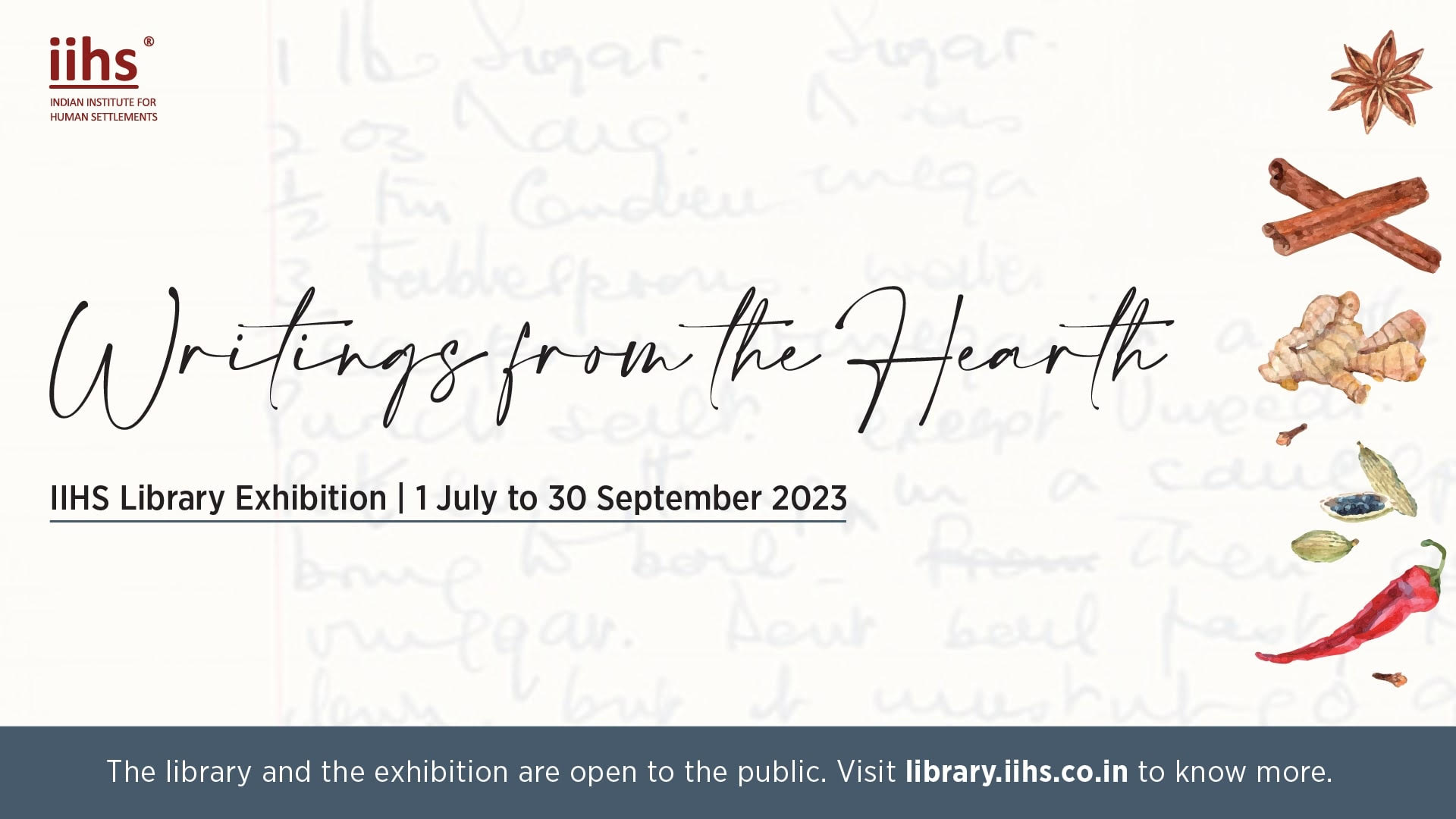 Writings from the Hearth
Writings from the HearthIn this exhibition, we’re bringing together writing about food that inspires larger conversations about culture, history, place and identity. Writing and food seem like separate worlds: while food is physical and immediate, writing is cerebral and timeless. But in these books, you’ll find a meeting of these worlds that brings you the history of food in our cultures; explorations of different kinds of kitchens, cooking and eating; and the dynamic relationships we all have with our means of sustenance. We invite you to sit at the table with us and enjoy the menu.
To access the list of books on display, click here, and to know more, write to library@iihs.ac.in
The library and the exhibition are open to the public, and as always, your book suggestions and feedback are welcome.
Looking forward to seeing many of you at the Library.
Curated by
Ishani Debroy, Asha Jhina and the IIHS Library team.
PICKING UP THE STONE: Decades in the making of Dalit Writing | 01 April – 30 June 2023
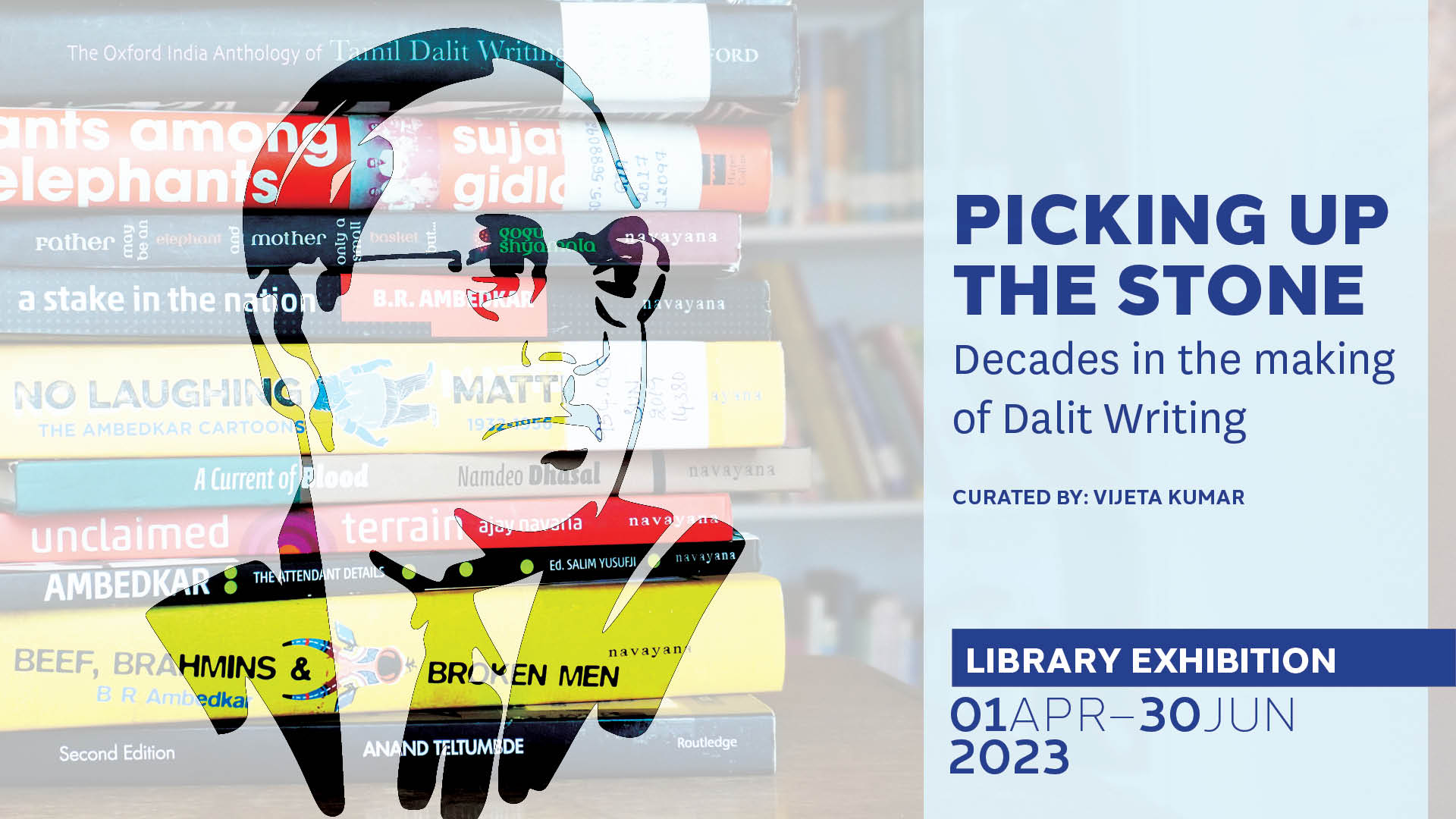 PICKING UP THE STONE
PICKING UP THE STONE
Decades in the making of Dalit Writing
01 April – 30 June 2023
Imagine, dear reader for the next few minutes, a young man hiding in the library just before closing hours so he can stay back with books all night and read until morning. Now imagine, a woman with wild hair, fist closed—asking—demanding for land that is rightfully hers. And then imagine Ambedkar drafting the Hindu Code Bill opening the newspaper one morning to find a humiliating cartoon of him where he is referred to by all kinds of names, then imagine Ambedkar closing the newspaper and heading to work.
Now imagine a young girl entering the world of school/ college/work, desperately learning how to be, learning how to combat the hate and disgust surrounding her—imagine her picking up one of these books and feeling a sense of fight, thrill, and justice filling up her body. Something changes for her after this. In fact, many things do. She finds in herself the next morning a courage to walk the path others have already built for her. But before that, the relief in knowing she is not alone gives her a new set of eyes to see the world with.
The books presented here are all for that young girl. They throw image after image of power, strength, dream, and the desire to live with dignity. The first is from Sujatha Gidla’s Ants Among Elephants. The second from Gogu Shyamala’s Father May Be an Elephant and Mother Only a Small Basket, But… The third from Unnamati Syama Sundar’s No Laughing Matter. The fourth is every girl, boy, man, woman, child who needs these stories to learn how to pick up the stone and throw. Here, dear reader are books yes, but also stones. Pick them up.
CURATED BY: VIJETA KUMAR
To access the list of books on display, click here, and to know more, write to library@iihs.ac.in
The library and the exhibition are open to the public, and as always, your book suggestions and feedback are welcome.
List of Books
| 1 | A current of blood / Namdeo Dhasal; poems selected and translated from the Marathi by Dilip Chitre | 9 | The Oxford India anthology of Tamil dalit writing / edited by Ravikumar, R. Azhagarasan |
| 2 | A stake in the nation : selected speeches / B.R. Ambedkar; edited by Bhagwan Das; introduced by Anurag Bhaskar; annotated by S. Anand | 10 | The Oxford India anthology of Telugu dalit writing / edited by K. Purushotham, Gita Ramaswamy, Gogu Shyamala and Mini Krishnan |
| 3 | Ambedkar: the attendant details / edited by Salim Yusufji; with an introduction by Bama | 11 | Towards an aesthetic of dalit literature: history, controversies, and considerations / Sharankumar Limbale; translated and edited, with a commentary, by Alok Mukherjee |
| 4 | Ants among Elephants: an untouchable family and the making of modern India / Sujatha Gidla | 12 | Unclaimed terrain / Ajay Navaria; translated from Hindi by Laura Brueck |
| 5 | Beef, brahmins, and broken men: an annotated critical selection from the Untouchables, who were they and why they became untouchables? / B.R. Ambedkar; edited and annotated by Alex George and S. Anand; introduction by Kancha Ilaiah Shepherd | 13 | When I hid my caste : stories / Baburao Bagul ; translated by Jerry Pinto |
| 6 | Dalits : past, present and future / Anand Teltumbde | 14 | ನಾವೂ ಇತಿಹಾಸ ಕಟ್ಟಿದೆವು : ಅಂಬೇಡ್ಕರ್ ಚಳುವಳಿಯಲ್ಲಿ ಮಹಿಳೆಯರು / ವಂದನಾ ಸೋನಾಲ್ಕರ್ (ಅನು.) by ದು. ಸರಸ್ವತಿ |
| 7 | Father may be an elephant and mother only a small basket, but– / Gogu Shyamala | 15 | ಸಣ್ತಿಮ್ಮಿ ಪುರಾಣ : ಆರು ಏಕಾಂಕಗಳು / ದು. ಸರಸ್ವತಿ |
| 8 | No laughing matter: the Ambedkar cartoons, 1932-1956 / edited and selected by Unnamati Syama Sundar |
(Un)restricted – Confronting expression of cultures and connections in public spaces | 1 Jan to 31 March 2023
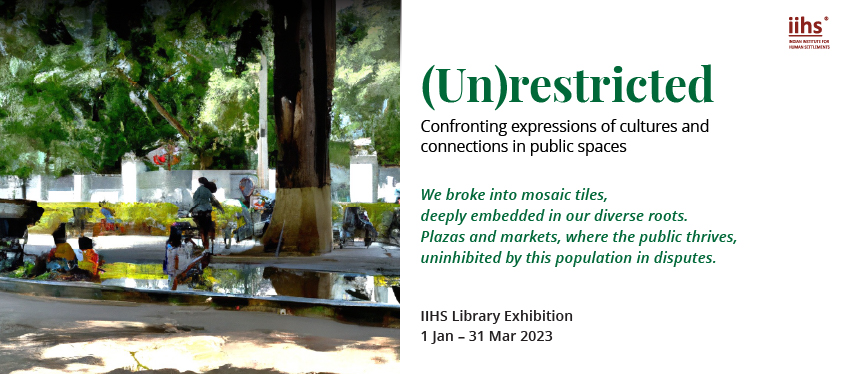
(Un)restricted – Confronting expression of cultures and connections in public spaces
1 Jan to 31 March 2023
IIHS is excited to announce its latest Library Exhibition ‘(Un)restricted – Confronting expression of cultures and connections in public spaces’ This exhibition invites you to explore dialogues that focus on public spaces beyond spatial configuration and the feeling of belonging in these transient environs that confront arguments about safety, ecology, health and inclusivity to question why we need our public spaces to remain unrestricted.
To access the list of books on display, click here, and to know more, write to library@iihs.ac.in.
The library and the exhibition are open to the public, and as always, your book suggestions and feedback are welcome.
List of Books
| 1 | Cairo: Memoir of a City Transformed: Ahdaf Soueif | 24 | Kumbh Mela: mapping the ephemeral megacity / edited by Rahul Mehrotra & Felipe Vera |
| 2 | A Sense of Space: The Crisis of Urban Design in India: Ranjit Sabikhi | 25 | Cubbon Park: The Green Heart of Bengaluru / Roopa Pai |
| 3 | Cities for People; Jan Gehl | 26 | Delhi by metro / Juhi Saklani & Divya Chowfin Diederichs. |
| 4 | Cities in Asia by and for the People: by Yves Cabannes (Editor), Mike Douglass (Editor), Rita Padawangi (Editor) | 27 | Variations on a theme park: the new American city and the end of public space / Michael Sorkin, editor. |
| 5 | Life between buildings: Jan Gehl | 28 | Central Park trees and landscapes: a guide to New York City’s masterpiece / Edward Sibley Barnard and Neil Calvanese. |
| 6 | Celebrating Public Spaces of India: Archana Gupta (Author), Anshuman Gupta (Author) | 29 | Community management of urban open spaces in developing economies / by Dr. Bharti Mohapatra, School of Planning and Architecture, Vijayawada, India. |
| 7 | Public Space Reader: Miodrag Mitrašinović (Editor), Vikas Mehta (Editor) | 30 | Shivaji park: dadar 28: history, places, people / Shanta Gokhale. |
| 8 | The Slow Boil: Street Food, Rights and Public Space in Mumbai (South Asia in Motion): Jonathan Shapiro Anjaria | 31 | Wake up clean up Bengaluru: feb 3-10, 2013 Freedom Park: documentation and executive summary Feb 2013 / |
| 9 | Street art, public city: law, crime and the urban imagination / Alison Young. | 32 | Lalbagh: sultans garden to public park / V. R. Thiruvady. |
| 10 | Art, space and the city: public art and urban futures / Malcolm Miles. | 33 | Glass house: the jewel of Lalbagh / Mysore Horticultural Society. |
| 11 | The latent city: when art excavates the city / directed by Krishnendu Bose. | 34 | Images of the street: planning, identity, and control in public space / edited by Nicholas R. Fyfe. |
| 12 | Gender space architecture: an interdisciplinary introduction / edited by Jane Rendell, Barbara Penner, and Iain Borden. | 35 | Nani’s walk to the park / written and illustrated by Deepa Balsavar. |
| 13 | Sidewalk city: remapping public space in Ho Chi Minh City | 36 | Nature in the city: Bengaluru in the past, present, and future / Harini Nagendra. |
| 14 | Temporary appropriation in Cities: Human spatialisation in public spaces and community resilience / edited by Alessandro Melis, Jose Antonio Lara-Hernandez & James Thompson. | 37 | Beirut, Imagining the City: Space and Place in Lebanese Literature |
| 15 | The social life of small urban spaces / by William H. Whyte. | 38 | A Pattern Language: Towns, Buildings, Construction |
| 16 | India: public places, private spaces: contemporary photography and video art | 39 | Multiple City writing on bengaluru; Aditi De |
| 17 | Squares: urban spaces in Europe / Sophie Wolfrum (ed.); [texts: Sophie Wolfrum, Nikolai Frh. v. Brandis, Alban Janson]. | 40 | Discovering Bengaluru: Meera Iyer (Author), Chiranjiv Singh |
| 18 | Loose space: possibility and diversity in urban life / edited by Karen A. Franck and Quentin Stevens. | 41 | PAST & CURIOUS – Forty Tales of Good Old Bangalore: Stanley Carvalho & illustrations by Paul Fernanades |
| 19 | What makes a great city / Alexander Garvin. | 42 | Key thinkers on space and place / edited by Phil Hubbard and Rob Kitchin. |
| 20 | Fairs, festivals and folk culture of Odisha / M. Padhy and A. Mahapatra. | 43 | Bangalore’s Lalbagh: A Chronicle of the Garden and the City: Suresh Jayaram |
| 21 | The Bangalore Queer Film Festival 2017 / | 44 | Rethinking Urban Parks: Public Space and Cultural Diversity: Setha M. Low |
| 22 | Change the way you move!: a central business district goes ecomobile / Tobias Kuttler, Theresa Zimmermann ; Konrad Otto-Zimmermann (ed.). | 45 | Surveillance, Privacy and Public Space: Bryce Clayton Newell (Editor), Tjerk Timan (Editor), Bert-Jaap Koops (Editor) |
| 23 | Fairs & festivals / Uma Vasudev. | 46 | Social interactions in urban public places: by Caroline Holland (Author), Andrew Clark (Author), Jeanne Katz (Author), Sheila Peace (Author) |
Margins—Multiple Perspectives of Human Settlements | 1 Oct to 31 Dec 2022

Margins—Multiple Perspectives of Human Settlements
1 Oct to 31 Dec 2022
It delves into the idea of the ‘margin’ from various vantages– historical, geographical, environmental, political, social-cultural and economical–all affecting human lives and habitats. This creates the scope to discuss stories of displacement, migration and exclusion from intersectional and interdisciplinary perspectives.
To access the list of books on display, click here, and to know more, write to library@iihs.ac.in.
The library and the exhibition are open to the public, and as always, your book suggestions and feedback are welcome.
What’s on your Plate: The Infrastructure of Eating in Cities | 1 Jul to 30 Sep 2022
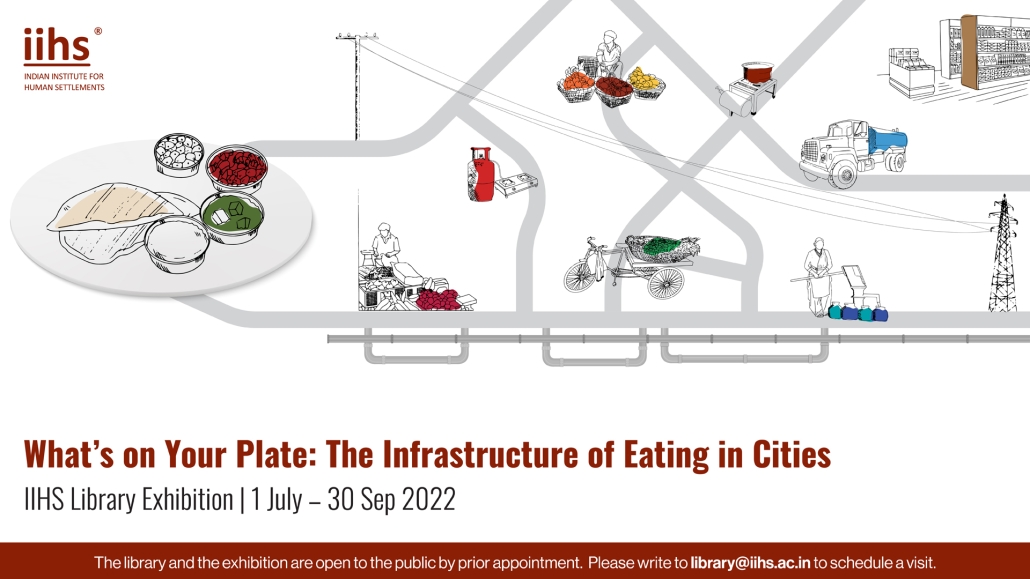
What’s on your Plate: The Infrastructure of Eating in Cities
1 Jul to 30 Sep 2022
To access the list of books on display click here.
Rooms of Requirement Libraries as Transformative Spaces | 1 April to 30 June 2022
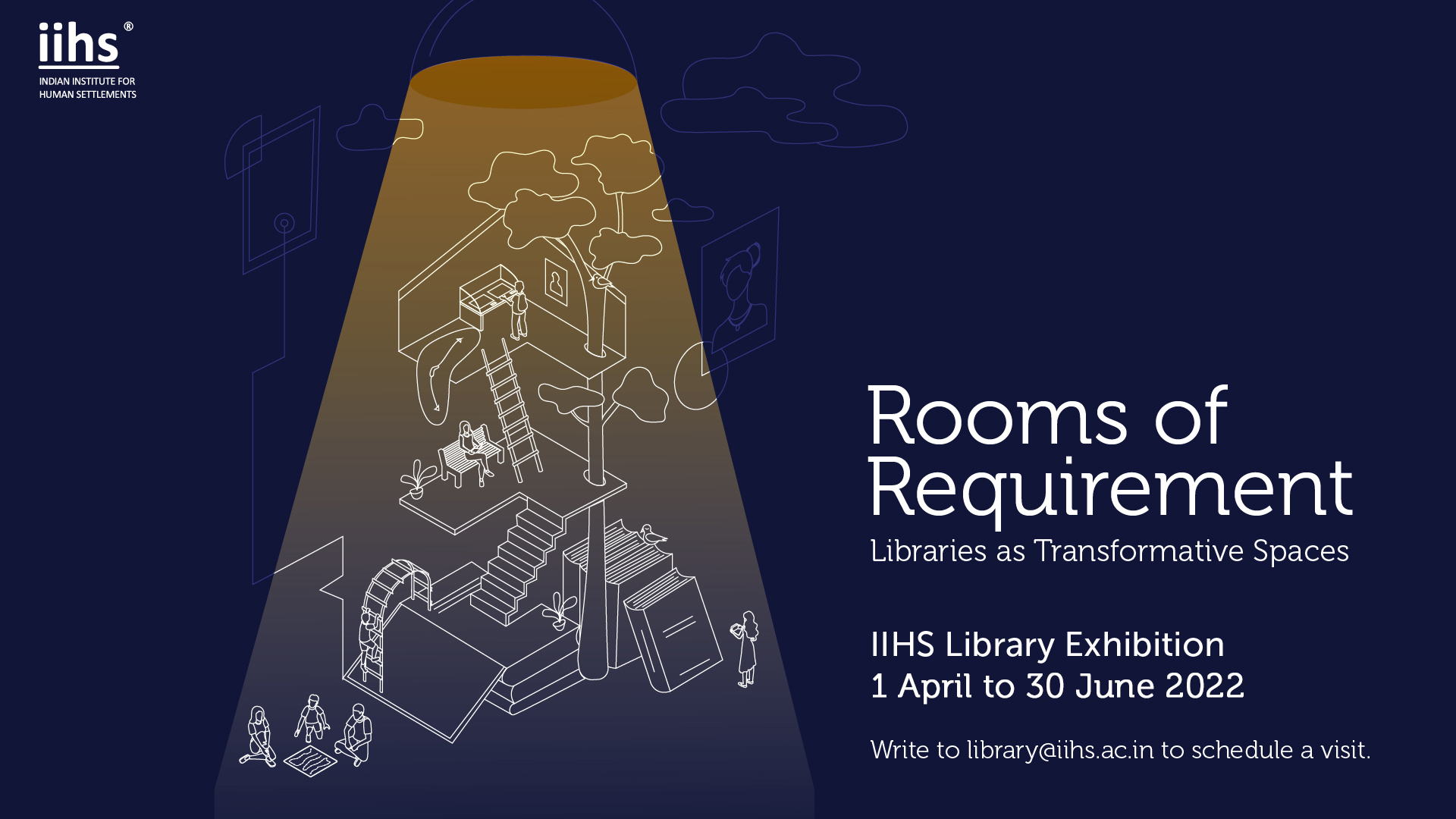
Rooms of Requirement
Libraries as Transformative Spaces
1 April to 30 June 2022
A library is never just one thing. It’s a place of possibilities. It’s often a space that transforms into what you need it to be: a classroom, a cyber café, a place to find answers, a quiet spot to be alone. It sits not just at the heart of a college or a university but also of communities and cities. Curated by the IIHS Library team, our latest exhibition brings together a variety of literature that looks at the many ways libraries enrich our lives – even in these digital times. The exhibition features fiction, non fiction and children’s literature as well as handbooks and guides on the ways that libraries serve the public and transform societies.
To access the list of books on display click here.
The library and the exhibition are open to the public by prior appointment. Please write to library@iihs.ac.in to schedule a visit.
Growing Sustainable Cities | 1 October - 31 December 2021
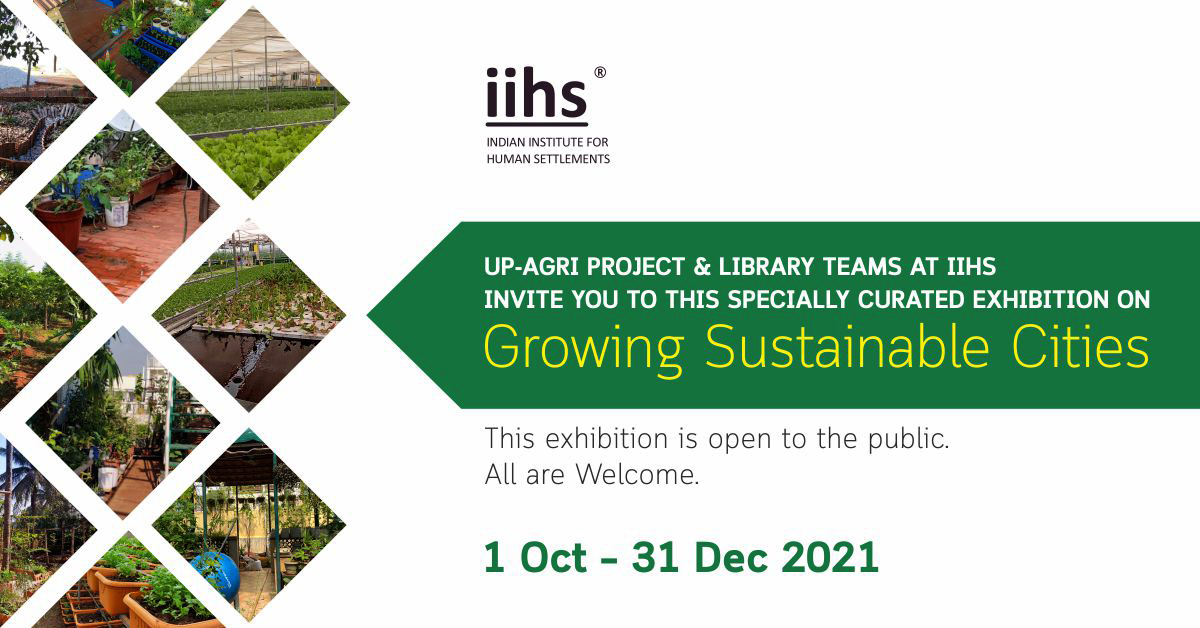
UP-AGrI project & Library teams at IIHS invite you to this specially curated exhibition on
Growing Sustainable Cities
1 October – 31 December 2021
This exhibition is part of IIHS’ ongoing research project, ‘Urban and Peri-Urban Agriculture as Green Infrastructure’, and delves into the various aspects of urban agriculture. The curated books and audiovisual materials capture what drives people to farm in cities, the multiple outcomes of urban agriculture, and how city planners can reminagine urban sustainability by including urban agriculture in their solution set. With diverse forms of urban farming at play in cities, this exhibition aims to investigate what it can offer—from diversifying diets to improving health and reducing ecological footprint to creating sustainable lifestyles.
Come and explore our rich collection of books and articles that delve into the different practices of urban farming, and unpack its linkages with urban sustainability and personal wellbeing.
The list of books on display in the Library for reference is accessible here. Please visit the Library to check out the exhibition. You can also send us your recommendations for this subject.
Kannada fiction on women by women | 1 April – 30 June 2021
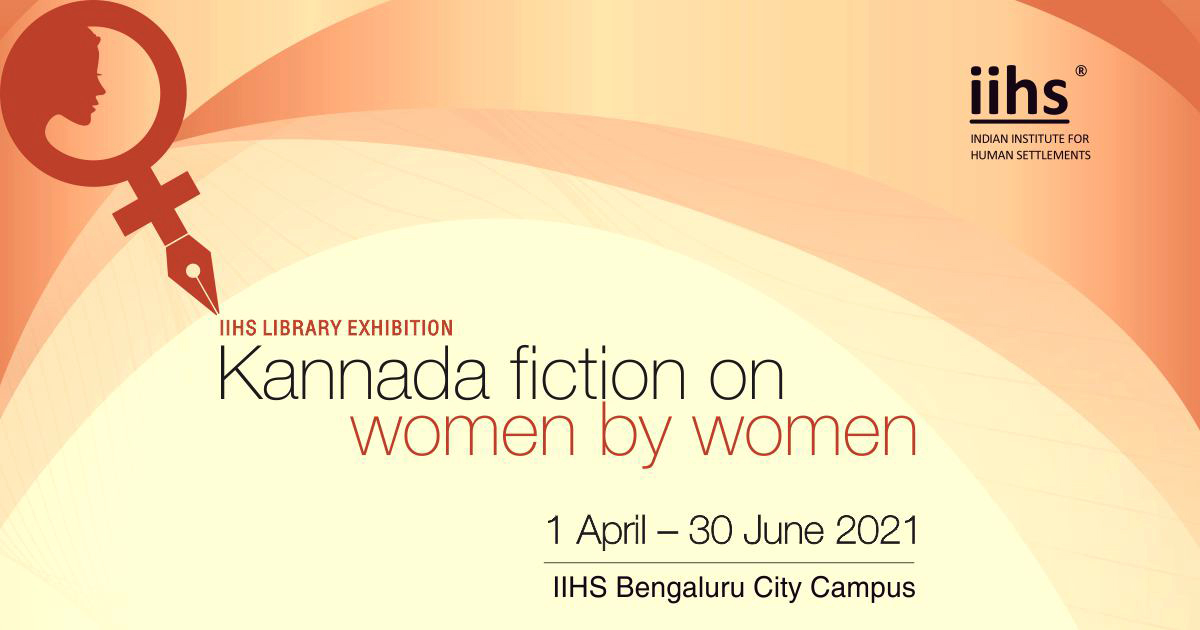
ಕನ್ನಡ ಕಾದಂಬರಿಗಳಲ್ಲಿ ಮಹಿಳೆಯರು
Kannada fiction on women by women
1 April – 30 June 2021
ಮಹಿಳೆಯ ಸಮಸ್ಯೆಗಳು ಅನಾದಿ ಕಾಲದಿಂದಲೂ ಇವೆ. ಈ ಸಂಕೀರ್ಣ ಸಮಸ್ಯೆಗಳನ್ನು ಬರವಣಿಗೆಯ ಮಾಧ್ಯಮದಲ್ಲಿ ಮಹಿಳೆ ದಿಟ್ಟತನದಿಂದ ಎದುರಿಸಿ ನಿಂತ ಬಗೆಗಳನ್ನು ಹಲವಾರು ಕಥೆಗಳು ಹೇಳುತ್ತವೆ. ಈ ಪುಸ್ತಕ ಪ್ರದರ್ಶನವು, ಲೇಖಕಿಯರು ತಮ್ಮ ದೃಷ್ಟಿಕೋನದಿಂದ ಮಹಿಳೆಯನ್ನು ಕಸ್ತೂರಿ ಕನ್ನಡದಲ್ಲಿ ಅಭಿವ್ಯಕ್ತಿಗೊಳಿಸಿದ ಹೆಚ್. ಜಿ. ರಾಧಾದೇವಿ, ತ್ರಿವೇಣಿ, ಎಂ. ಕೆ. ಇಂದಿರಾ, ಇನ್ನೂ ಮುಂತಾದ ಲೇಖಕಿಯರ ಕಾದಂಬರಿಗಳನ್ನು ಪ್ರದರ್ಶಿಸುತ್ತದೆ.
Women have always faced a myriad of challenges. Several stories reveal the ways in which women have boldly confronted such difficulties. This book exhibition showcases the novels in which Kannada authors express their perspectives on women’s issues in writing.
The list of books on display in the Library for reference is accessible here. Please do visit the Library to explore the featured books and recommend if you have any book suggestions.
Because of Covid-19 precautions, this event is not open to the public, so please don’t circulate.
ತಮಗೆಲ್ಲರಿಗೂ ಸ್ವಾಗತ / Tamagellarigoo Swaagata
Curated by
Amrutraj Ravi Benahal
Zooming in: whose lens is it anyway? | 11 January – 31 March 2021
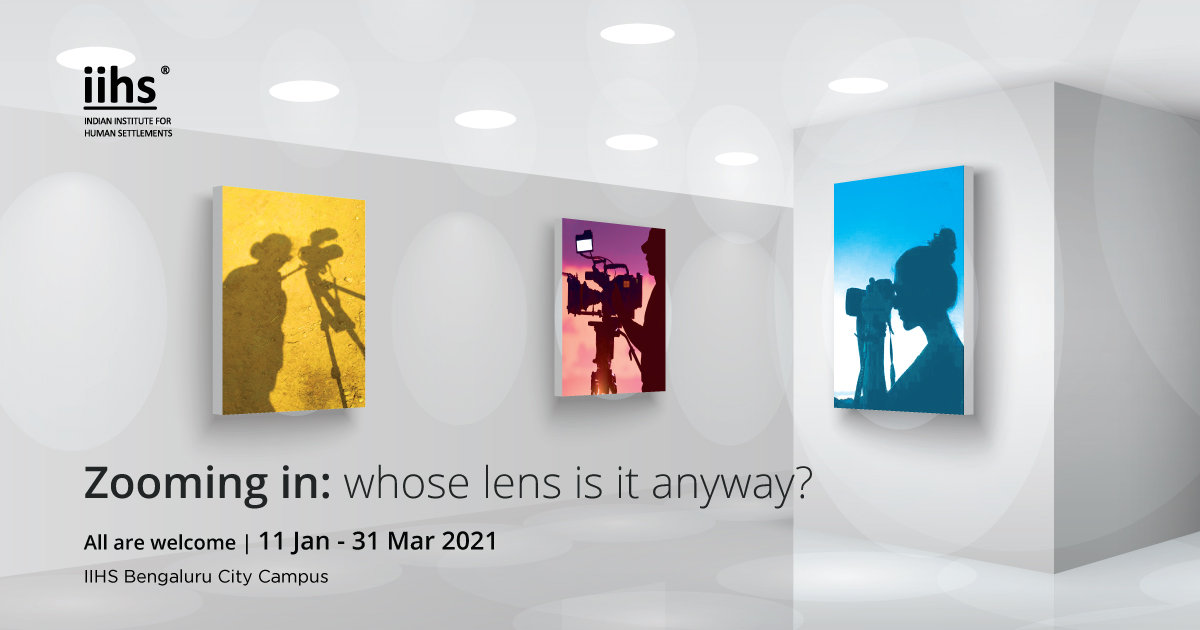
Zooming in: whose lens is it anyway?
11 January – 31 March 2021
In 2018, Rachel Morrison became the first woman to be nominated for an Academy Award for Best Cinematography. The world of cinematography and photography have always been inhabited by multiple lenses and provide diverse ways of seeing. The works of Vivian Maier, Agnes Varda, Cindy Sherman, Nan Goldin, Sabeena Gadihoke and Sunil Gupta are a testament to that. But the mainstream narrative has always been singular. It is time that we rediscover these diverse oeuvres and also turn our gaze to new and emerging works.
The dominant narratives and works that come into the fore have been determined by people who occupy the top rungs of the power structure in terms of race, caste, class and gender. What works would emerge if the realm of cinematography and photography was wielded by those who have historically been outside these power structures? How would they negotiate with these structures? How would they reshape and restructure already existing perspectives? Most importantly, how can the heteronormative way of seeing be subverted to accommodate multiple lenses to better understand these forms?
Through this library exhibition, we seek to explore the lives and works of photographers and cinematographers who identify as womxn and queer from around the world.
Exploring Indian identity through material and visual culture | 16 October – 24 December 2020
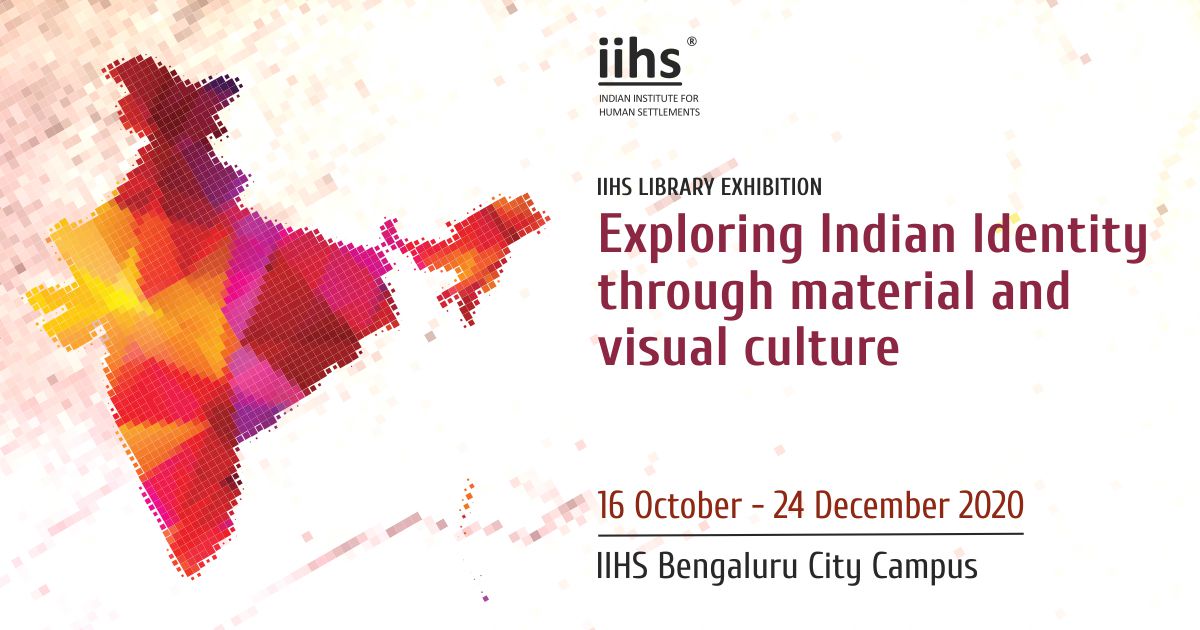
Exploring Indian identity through material and visual culture
16 October – 24 December 2020
The pervasive power of visual and material culture in India’s political and social landscape is undeniable. This exhibition seeks to explore the ways in which the production, distribution and consumption of myriad visual and material culture shape competing Indian identities. We do this by unfolding aesthetic and material production not as a by-product of the context, but as the very grounds for it.
Attached is the list of books on display in the Library for reference. Please do visit the Library to explore the featured books and recommend if you have any book suggestions and as always your feedback is welcome.
Gawk. Wonder. Devour. | 16 January – 31 March 2020
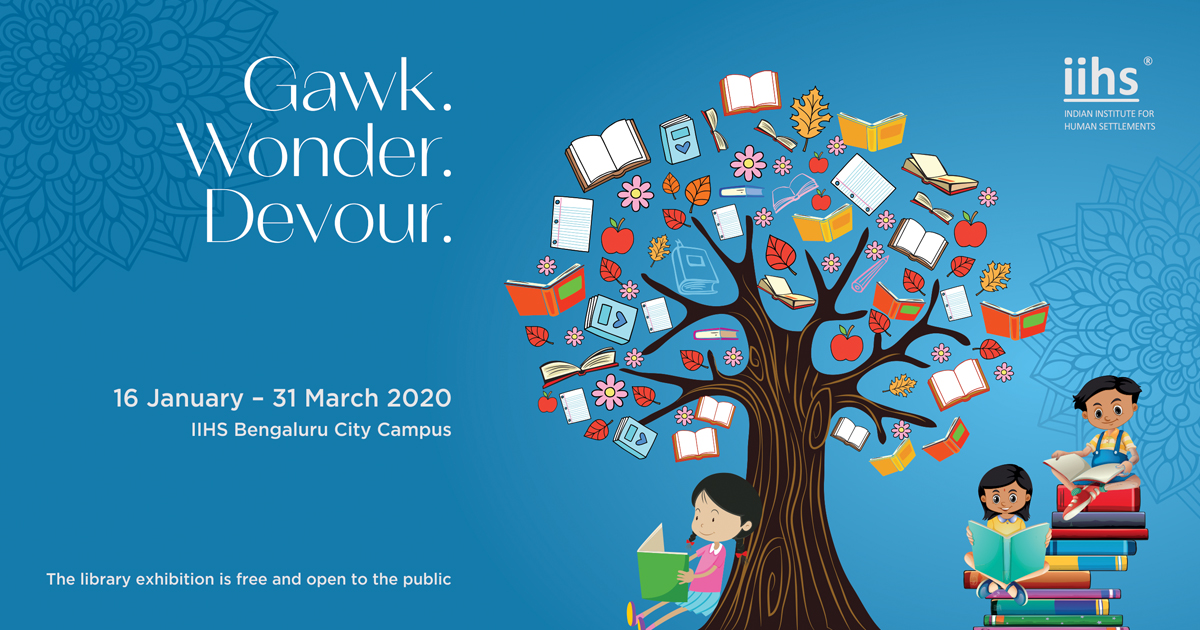
Gawk. Wonder. Devour.
16 January – 31 March 2020
Gawk. Wonder. Devour, the quarterly library exhibition is open from 16 January to 31 March at the IIHS Library. Explore what it feels like to be a child in 2019, reading through Indian children’s books. What’s Neema Eating Today is a picture book about eating seasonal fruits and vegetables. Walking is a Way of Knowing shows us Western Ghats through the eyes of the indigenous Kadar tribe. Through the eyes of Korok, a tribal boy, Year of the Weeds shows young adults how India works—police, courts, development and representation. There are also books about contemporary women scientists in India and those around disability, armed conflict, waste management and autism.
Come, be a child with these delightful children’s books. They are as much for adults.
This exhibition is free and open to the public.
Gawk. Wonder. Devour. | 1 October – 31 December 2019

Gawk. Wonder. Devour.
1 October – 31 December 2019
If you grew up in India, the odds are you were reading about scones, ginger beer, licorice and lacrosse. We’ve sauntered down hillsides with Ruskin Bond, befriended the man-cub with Rudyard Kipling, explored small towns with RK Narayan and gone on adventures with Robinson Crusoe. Amar Chitra Katha, Panchatantra and Aesop’s Fables have all been read too. But we rarely read books about children like us; relatable books that mirrored our lives.
Gawk. Wonder. Devour, the quarterly library exhibition is open from 1 October to 31 December at the IIHS Library. Explore what it feels like to be a child in 2019, reading through Indian children’s books. What’s Neema Eating Today is a picture book about eating seasonal fruits and vegetables. Walking is a Way of Knowing shows us Western Ghats through the eyes of the indigenous Kadar tribe. Through the eyes of Korok, a tribal boy, Year of the Weeds shows young adults how India works—police, courts, development and representation. There are also books about contemporary women scientists in India and those around disability, armed conflict, waste management and autism.
Come, be a child with these delightful children’s books. They are as much for adults.
This exhibition is free and open to the public.
in Stills | 1 July – 30 September 2019
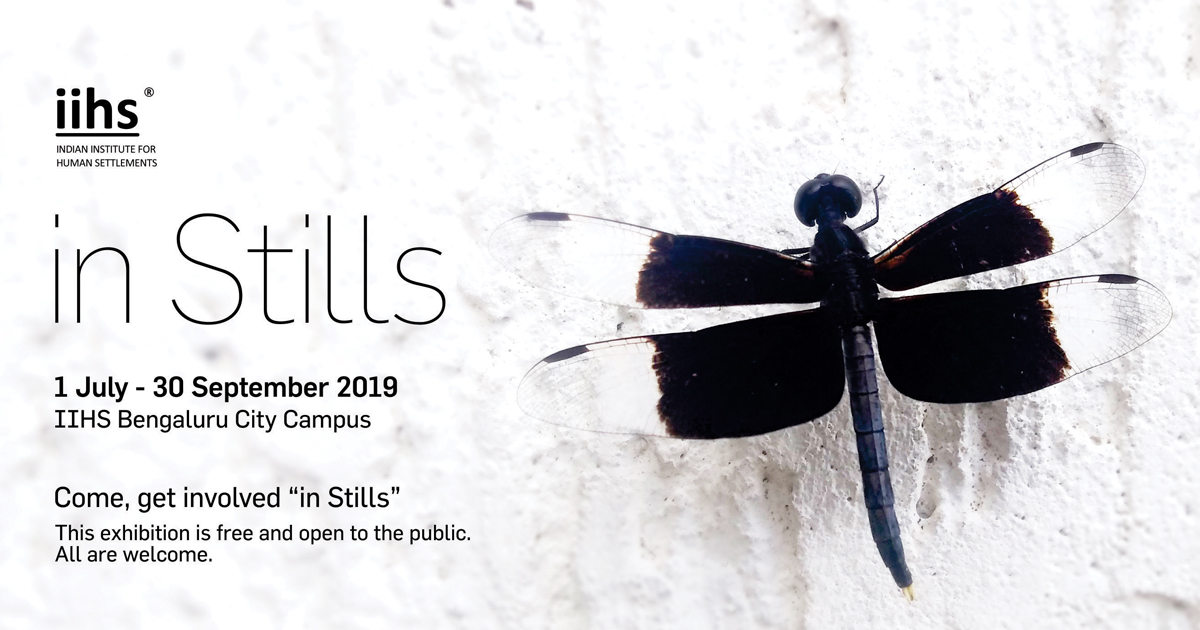 in Stills
in Stills
1 July – 30 September 2019
Thanks to the Internet, we live in an age of constant image overload. Take a break. Come offline with us as we bring you some of the best photo books by world famous photographers. “in Stills”, IIHS Library’s quarterly exhibition in collaboration with the Media Lab, is open from 1 July to 30 September.
For appetizers we have Camera Lucida by Roland Barthes. Read through Barthes’ reflections on photography to begin your detox. Next up is Henri Cartier-Bresson: Masters of Photography Series, a book on the works of the master photographer who proposed the concept of decisive moment in photography. Joining him on the main course is, Ansel Adams: 400 Photographs, a chronologically arranged photo book on another legend. For dessert we have Vivian Maier: Street Photographer. Vivian Maier was discovered posthumously exposing her body of work—a massive 1,50,000 photographs covering people, portraits and architecture.
Come to the exhibition for our selection of the works of legendary and contemporary photographers ranging from portraits to landscapes and from architecture to war photography.
Stay for Found Photography, a collection of impeccable works of art by common people, found and curated off the Internet. Begin your offline photo detox today!
Please do visit the Library to explore the featured books and spread the word.
This exhibition is free and open to the public.
History of Urbanisation: Through the Eyes of Women | 8 April – 30 June 2019
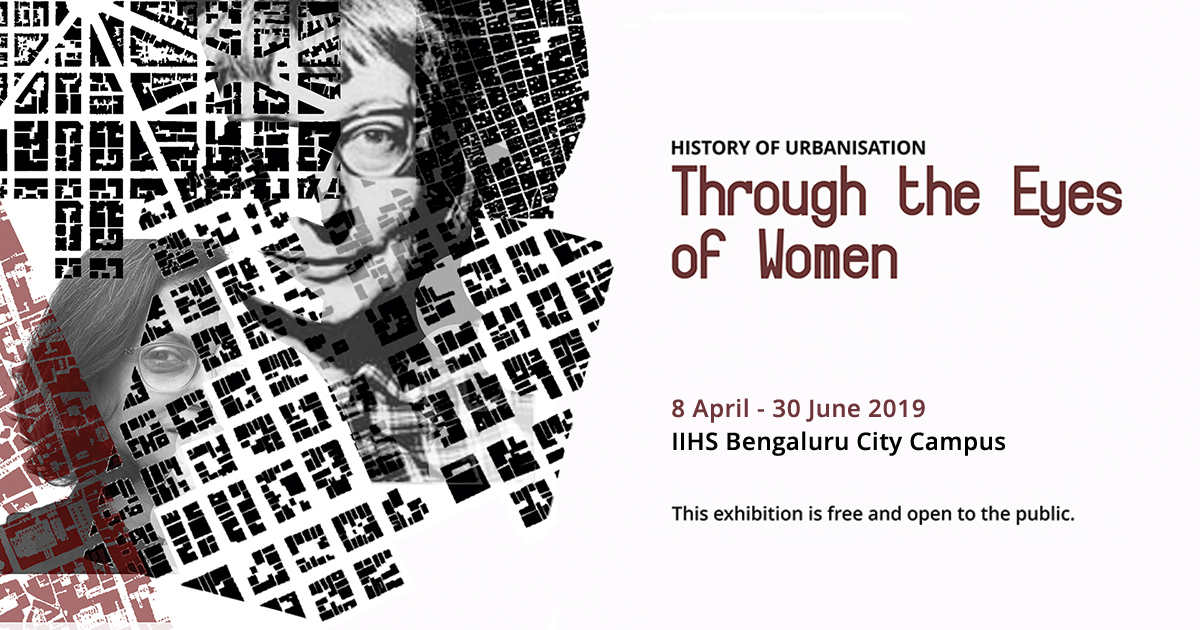
History of Urbanisation
Through the Eyes of Women
Cities have always been presented to us as grand visions of planners—often men. This book exhibition showcases the history of urbanisation through the eyes of women who have contributed to city planning and urban policies globally.
8 April – 30 June 2019
This exhibition is free and open to the public.
Urban Livelihoods | 11 February 2019 – 30 March 2019
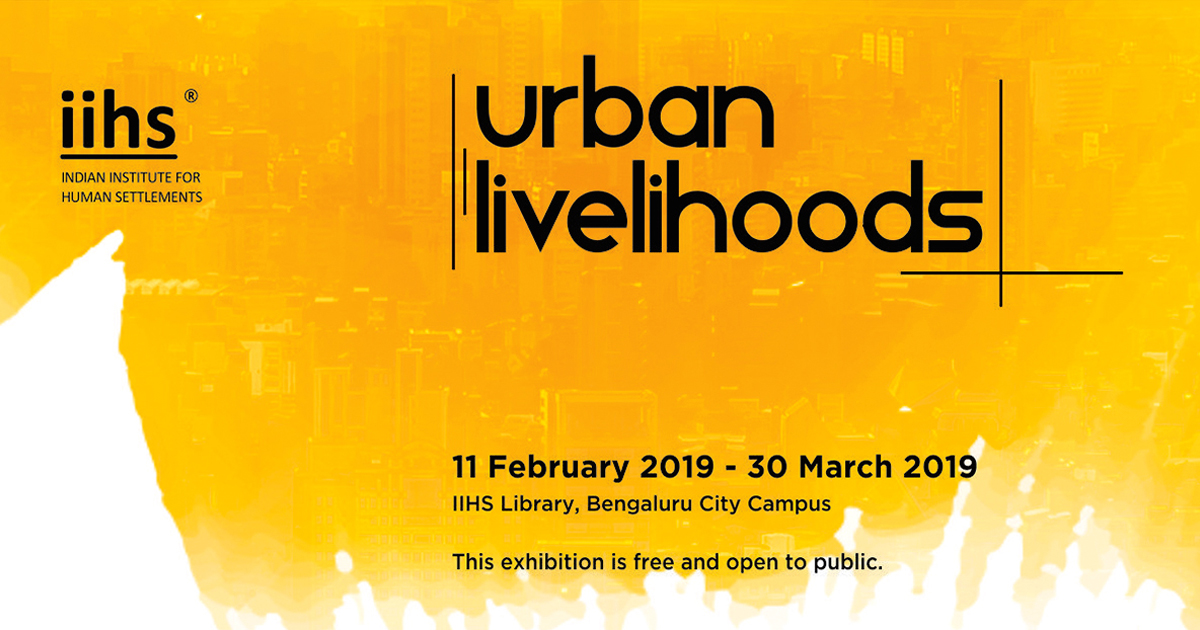
Urban Livelihoods
The promise of better employment is what draws many people to cities. While the city presents innumerable opportunities of livelihood, not everyone can avail these opportunities equally. The urban poor are more vulnerable and exposed to risks than others, while engaged in informal livelihoods, forming an integral part of the urban fabric.
Through this exhibition we explore the different aspects of urban living such as labour and employment, linkages between housing and livelihood, access to micro-credit, risk of evictions and resilience through difficult times.
11 February 2019 – 30 March 2019
IIHS Library, Bengaluru City Campus
The Library exhibition is free and open to the public.
Memories and the City | 15 October ~24 December 2018
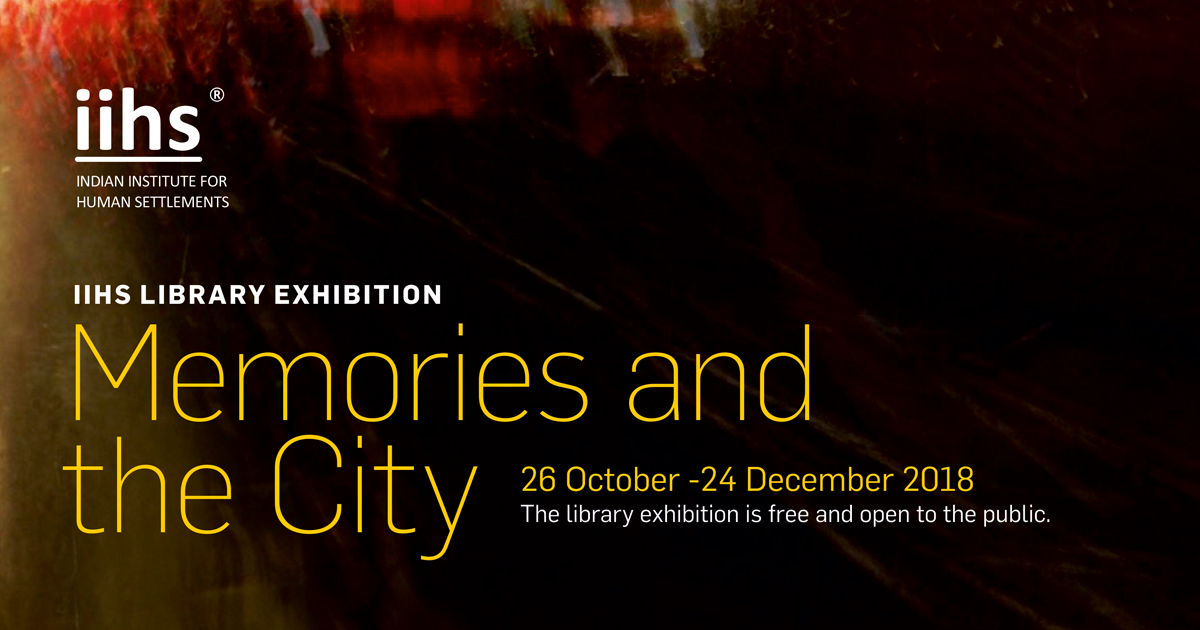
Memories and the City
Is it possible to tell stories about our lives without those of the physical spaces we inhabit? How closely are our struggles for personal coherence driven by how we experience these spaces? We often trace our memories by the shifts in a city—the one we grew up in, the one that we came to love or that we feel ambiguous about. How do these memories of the city shape our memories of ourselves?
Visit the IIHS Library exhibition, “Memories and the City” to reflect on your stories and memories of and in the city.
15 October ~24 December 2018
IIHS Library, Bengaluru City Campus
The Library exhibition is free and open to the public.
Politicising the Plate | 5 August – 30 September 2018
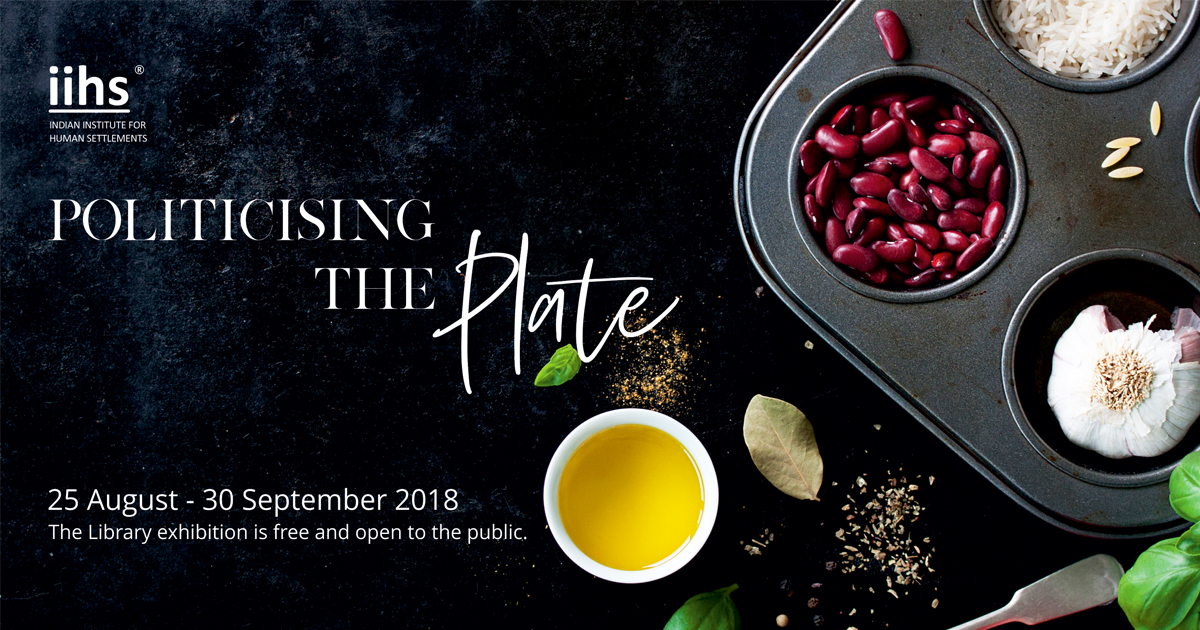
Politicising the Plate
Eating is an intimate visceral and political experience, with aromas and tastes merging with social orders to produce particular ways of consuming and rejecting food. Culinary preferences and habits do not exist in a vacuum but traverse material and symbolic foodways. This exhibit is a journey through the bylanes of the food landscape, tracing and visibilising its trajectory and entanglements across histories, politics, sectors, scales and people. We invite you to explore food as it moves from seemingly idyllic moorings in pristine agrarian surroundings to grime-encrusted factory floors in booming agro-food parks, from fluctuating commodity futures markets to tech-savvy e-retailers, from street vendors to upscale organic food stores, and from culinary tourists to you.
Calcutta - Kolkata | 30 April - 29 June 2018
How do we read a metropolis? A book, pamphlet, or even marginalia can take us to an imagined space that often exceeds the author’s intention. Such an escape beyond the frame of the text perhaps has to do with the complexity of the metropolis, the impossibility of fully capturing its essence or representing it. Reading these texts may open up new possibilities of seeing the city. Through this curated exhibition of texts, we invite you to daydream about the metropolis, going beyond the boundaries of the written word.
30 April – 29 June 2018
IIHS Library, Bengaluru City Campus
The Library exhibition is free and open to the public.
Literaryscapes: Imagining the urban in literature | 03 January – 31 March 2018

Literaryscapes: Imagining the urban in literature
Cities have been the crucibles of civilization. The slow, solemn song of history first found voice in cities, and the history of human literature has also often been the history of human settlements.
What, then, is the landscape of cities in literature? From the god-kings of Uruk to the presidential strongmen of our times, cities have been imagined variously. They have been charged with many meanings, and have served as melting pots for various cultures, dispensations, and aspirations. In this exhibition, IIHS Library is excited to explore the urban through the variegated canons of literature. Combining genres, stylistics, and settlement typologies, Literaryscapes hopes to understand more closely not just the politics but also the aesthetics of what it means to be urban.
03 January – 31 March 2018
IIHS Library, Bengaluru City Campus
This exhibition is free and open to public.
Pin Drop (13,77.6) | The Art and Science of Map Making | 03 October – 22 December 2017
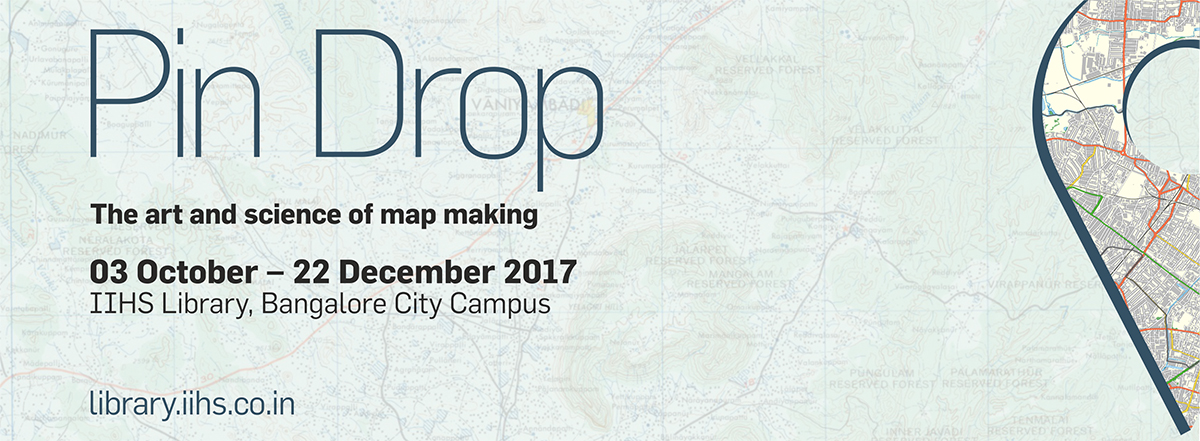
Pin Drop (13,77.6) | The Art and Science of Map Making
Maps are amazing. They are pieces of art and tell us a story, real and fictional. Maps are helping us explore, navigate, document and visualise the world for many centuries. While the process and the technique of map making have changed, maps have remained important all along.
In continuation of our earlier exhibition, IIHS Library announces its 12th exhibition on maps ‘Pin Drop’ starting October 2017. The exhibition displays informative and beautiful maps and atlases of cities and countries of the world some in thematics—heritage, history—and others in physical geography settings.
Having a collection of about 600 maps in total at the IIHS Library, some of the maps and other cartographic publications that are showcased as part of the exhibition are Maps of Delhi, Landforms of India from topo maps and images, Mapping India and Principles of map design and Making maps. And some of the world cities featured are London: a life in maps, London: a history in maps, Les Plans de Paris, Berlin: Stadtplan, Concise atlas of the world, UNESCO world heritage atlas, Oxford atlas of the world and many more.
03 October – 22 December 2017
IIHS Library, Bangalore City Campus
The exhibition is free and open to public.
Affordable Housing in Urban India | 03 July–30 September 2017
Affordable Housing in Urban India
03 July–30 September 2017 | IIHS Library, Bangalore City Campus
Housing supply for the income poor has always been understood in terms of quantifiable outputs and minimum square feet. On the other hand, the formal and private housing market for those who can afford to pay is bound by no such restrictions. In light of the growing housing shortage and the increasing prices of real estate, ‘affordable housing’ has been posited as a possible solution. This refers to housing that is affordable to those who earn less than the median income. Recent policies and government initiatives have been geared towards creating an enabling environment to increase the supply of affordable housing stock and address the issue of inadequate housing.
This eleventh IIHS Library exhibition attempts to unpack concepts such as affordability, viability and adequacy, which are key to understanding current debates and policy regimes concerning affordable housing in India. Towards this end, it makes available a wide range of resources, including academic texts as well as government policy reports. These available books and data can be searched at Library Catalogue.
On Practice: An exhibition of cinematic journeys | 27 April – 27 June 2017
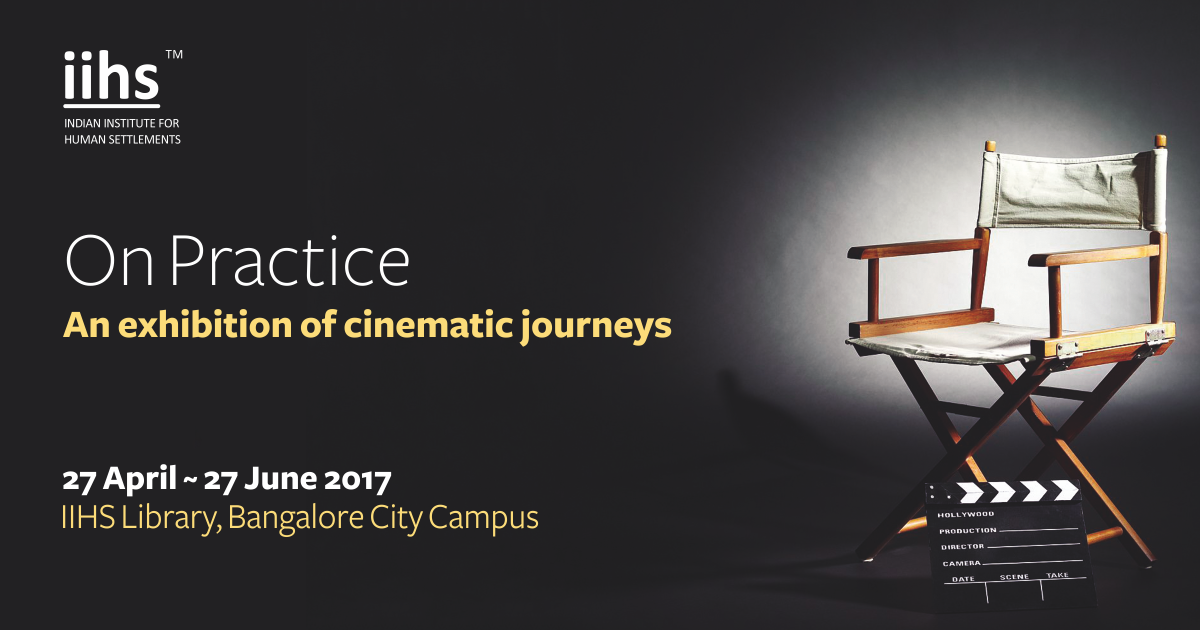
On Practice: An exhibition of cinematic journeys
27 April – 27 June 2017 | IIHS Bangalore City Campus
Who are the people behind this ubiquitous medium of cinema? What goes on in their minds? What are the experiences that have shaped their world view and their cinematic language? And more importantly, why is it important for us to understand the practice of their craft?
While academic writing and film criticism are important lenses through which we understand the medium of cinema, and a whole range of writing exists around it, not too many film practitioners have written about the process of creating their craft, and what particular contexts and histories have shaped their work. At a time where the proliferation of digital technology has made the medium of cinema accessible, it becomes even more important for us to understand what the practice behind filmmaking is, and how have these practices have shaped the audio-visual culture over time. This IIHS Library exhibition, in collaboration with the Media Lab is an attempt to engage around works (books/films), that enrich our idea of film practice. This exhibition puts together books and films about films and the people and practice behind those films.
Among the books that will be showcased as a part of this exhibition, Shooting Women explores the lives of camerawomen working in films and TV while Fearless Nadia is about India’s original stunt queen. Written by Salim-Javed: The Story of Hindi Cinema’s Greatest Screenwriters showcases how the duo of Salim Khan and Javed Akhtar ushered in a new era for screenwriters in Hindi cinema. In My Brother Shankar Ananth Nag speaks about the life of the actor, producer and director Shankar Nag. Double Take is collection of essays bringing together the thoughts and reflections of filmmakers, technicians, critics and enthusiasts, to engender a second look at the place and practice of the documentary film in contemporary India. Hitchcock by Francois Truffaut presents interviews with Alfred Hitchcock about his vast directorial career.
The exhibition also showcases films that explore similar themes. Celluloid Man traces the journey of India’s legendary archivist PK Nair and Profession Documentarist is about the experiences of seven Iranaian female documentary makers. Miss Lovely is a stylized fictional account of the crime and grime of Mumbai’s C-grade film industry and Superman of Malegaon is a heartwarming documentary on the movie making industry in Malegaon.
This exhibition presents a chance for the public to enter a world beyond what we experience on the cinema screen. These available books and films can be searched at Library Catalogue.
UNEASY - Library Exhibition on Architecture, Spatial Design and Development | 25 January – 31 March 2017
 UNEASY – Library Exhibition on Architecture, Spatial Design and Development
UNEASY – Library Exhibition on Architecture, Spatial Design and Development
25 January – 31 March 2017 | IIHS Bangalore City Campus
Architecture has always been tasked with serving development, be it ‘Development’—in the form of private, exclusive and ‘market-oriented’ expressions, or ‘development’—with respect to public spaces, public buildings and social infrastructure. Architectural endeavour seems to be growing increasingly comfortable with the former, engendering in our cities a sense of exclusion and homogeneity of space, while veering away from its responsibility towards socio-economic equity and socio-cultural transformation. This renders the relationship between architecture and development
UNEASY.
This exhibition seeks to provoke a discussion around an approach that places greater value on culture, place identity, sustainability, diversity, health and resilience. You are invited to engage with the works—historical, contemporary and conceptual—of architects who have been ambassadors of place-sensitive and responsive forms of spatial design. Together, these constitute an inquiry into the developmental role of architecture and spatial design, ranging from social housing and gendered spatiality to design-thinking and universal architecture.
The exhibition is free and open to the public.
New Town Development: India and the World | 1 Oct ~ 31 Dec 2016
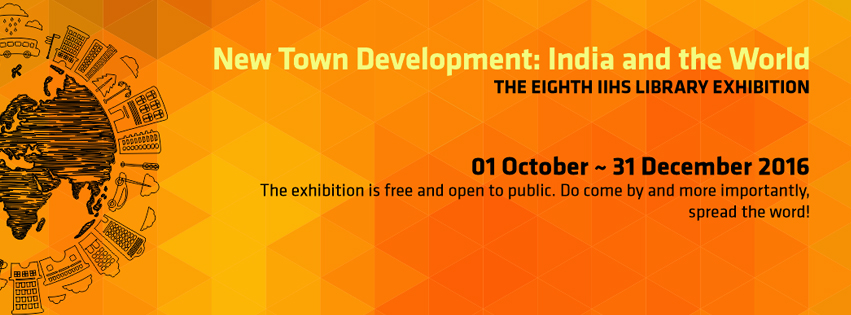
NEW TOWN DEVELOPMENT: INDIA AND THE WORLD
01 October ~ 31 December 2016 | IIHS Bangalore City Campus
From satellite towns to company towns, from garden cities to sustainable and intelligent cities, the new town movement has taken multiple forms over time to serve newer aspirations but has endured as a practice in urban planning. The exhibition will feature work by academics and practitioners from diverse fields like economics, sociology, anthropology, planning, architecture, design and ecology who trace the history, economics and futures of the new town movement across the world. The exhibition includes deliberations on planning trajectories and the various socio economic and ecological consequences of new towns across geographies.
Pin Drop (13,77.6) | 15 October - 31 December 2015
Pin Drop (13,77.6)
15 October – 31 December 2015 | IIHS Bangalore City Campus
IIHS Library is proud to announce an exhibition on cartography, the art and science of map-making. The Library hosts a rich collection of historical and thematic maps, that tell the story of India dating back to the late 1800s. On display will be maps published by the Survey of India, Census of India, Geological Survey of India, National Atlas & Thematic Mapping Organisation, Imperial Gazetteers and a vast number of private and institutional publications. The Library will also showcase its large collection of publications on the theory and applications of cartography.
Short live-demonstrations will be held during this exhibition to introduce visitors to the art of map-reading. The exhibition will begin in October and go on till the end of December, 2015.
Do come by and explore the world around you from the comfort of the IIHS Library!
Climate Change and Cities | 1 June – 31 August 2015
Climate Change and Cities
01 June – 31 August 2015 | IIHS Bangalore City Campus
Climate change, considered as the greatest challenge of our times, is impacting cities more severely and dangerously than ever before. Millions of people, infrastructure and ecosystems are highly vulnerable to impacts of climate change such as sea level rise, increased precipitation, and increasing number of extreme events.
IIHS library is exhibiting a rich collection of books on Climate Change and Cities that spans a variety of themes including global and national mitigation and adaptation strategies for climate change in cities, disaster risk reduction, risk management and resilience building, climate policy and governance, and many more.
Do come by and more importantly, spread the word! The exhibition will go on till the end of August and is open to public.
Organized by CARIAA & Library Teams
KA-POW! | 1 September 2014
Library holds an exciting collection of graphic novels, cartoons, comics and a few texts on the comic form. Apart from the RK Laxmans, the Frank Millers, the Sarnath Banerjees, and a lovely tome of Bill Watterson’s enduring classic Calvin and Hobbes, here are some books to look out for:
- Will Eisner’s A Contract with God
- Vishwajyothi Ghosh’s compilation of Partition narratives, This Side That Side
- A Little Book on Men, which is a little book on men with a foreword by resident rockstar Gautam Bhan.
- Essential reading – The Complete Maus by Art Spiegelmann
- The DC Comics Encyclopedia (for the malingerers who have been planning to attend Comic Con)
Please do come by and more importantly, spread the word! The exhibition will go on till the end of September and is open to public.
Curated by Rihan Najib and Library Team.
Mumbai | 29 January 2014
This month, we have the fourth of our IIHS Library Exhibitions: Hocus Focus Mumbai. Yes, we’ll be concentrating on one of India’s most well-known and beloved cities [Note to Self: Assiduously avoid meeting Dilli people until next exhibit].
Introduction
Unless you’ve who’ve lived in the south of South Mumbai all your life (in which case, your universe’s northern limit is Regal Cinema…Voyager probe be damned), Mumbai, for most people, extends from the areas of Colaba and Fort in the South to Kandivali and Borivali in the North. What about the East and West? Well, Mumbai happens to have a rather unusual form. What with that and with all major roads and railway lines running north-south, most Mumbaikars seem to visualise their city as being laid out on the north-south axis. That is, until they need to travel to Chembur and beyond, eliciting complaints about the railway’s Harbour Line.
Some people have lots of cheeky, politically incorrect debates on whether areas beyond Borivali, such as Vasai and Virar can be considered part of the city or not. Others smugly declare that Mumbai ‘ends’, much before, at Andheri or Mahim. Well, whatever you wish to believe, few can deny that each of these places has its own charm, its own characteristics and its own contribution to the teeming melting pot that is Mumbai.
The Exhibit
Begin your own exploration of Mumbai by visiting the open space on the second floor. The notice board next to the classroom entrance contains some vibrant pictures of Mumbai, showcasing its spaces, its people, its colours and contrasts.
This space also contains two interesting articles – one is by Naresh Fernandes on the city’s long association with jazz music and the musicians who formed an integral part of Bombay’s golden age of jazz in the 1930s and 40s. Another is an article on Kapil Gupta, an architect involved in the renovation (some may also add gentrification) of Mumbai’s industrial spaces. One of his most well-known designs is that of Blue Frog, the performance space/watering hole built out of one of Mumbai’s defunct textile mills.
Following this, move on to the third floor where the notice board outside the library contains more pictures and articles. One article is a review of Kaiwan Mehta’s book Alice in Bhuleshwar, which talks about one of Mumbai’s oldest localities. Another is written by a Mint journalist (on the eve of Mint‘s office shifting from Dadar to Lower Parel) on Mint employees’ relationship with eateries, restaurants and food joints of Dadar.
Move ahead to the exhibition space inside the library, where its collection of books and films on Mumbai are on display. Some of them are briefly described below:
(a) Gyan Prakash’s Mumbai Fables provides a rich narrative of some of Mumbai’s most well-known events, ranging from its days as a textile giant to the growth of tabloid journalism with the Commander Nanavati murder case to the contestations over Backbay Reclamation as well as the industrial collapse of the 1980s.
(b) Shobha Bhondre examines one of Mumbai’s most famous institutions – the dabbawalas. Translated from Marathi and narrated by both Raghunath Medge (the President of the Dabbawala Association) and by Shobha Bondre, the book Mumbai’s Dabbawalas attempts to shed some light on the way this unique organisation works.
(c) Bombay Stories is a collection of translated short stories by the Urdu writer Saadat Hassan Manto. Manto, who lived in the city during the 1930s and 40s, has written several stories set in the city during the period. For a review of this book, see http://www.livemint.com/Leisure/1vj4VZEpu7A1q9Mzr0MKQN/Bombay-Stories–Saadat-Hasan-Manto.html
(d) Katherine Boo’s Behind the Beautiful Forevers is the outcome of the author’s three-and-a-half year project documenting the lives of people in Annawadi, one of the slums next to Mumbai’s International Airport. Well-received and much acclaimed, it provides some haunting accounts of life in Annawadi.
The exhibit contains several films about or set in Mumbai like the visual essay on Mumbai on Vertical City, Rahul Mehrotra on the city of opportunities in One City, Two Worlds, and Chakra set in the social conditions of slums in Bombay and so on.
Life Sciences and The Urban Practitioner | 4 September 2013
Patrick Geddes, this polymath who was also the Maharaja of Indore for a day, put it quite well when he said, “This is a green world, with animals comparatively few and small, and dependent on the leaves. By leaves we live.”
There ought to be something said about how disciplines around urbanization focus largely on the human subject, as if we were the only ones inheriting the earth. Though subjects such as urban ecology aim to attend to such a skew, what is missing is a vision of things as protean, but nevertheless unified. In this respect, it is worth looking at the mandate of planners such as Patrick Geddes and G.H. Krumbiegel, who sought to relate the natural sciences to social and ethical systems for a wider understanding of cities, the past, the present and the possible.
This brings us to the theme of the third IIHS Library Exhibition- “Life Sciences and the Urban Practitioner”, which showcases a wonderful collection of books in the fields of urban ecology, socio-ecology, urban biology and the natural sciences.
Do go through the seminal works that introduce the disciplines of urban ecology and ecosystem sciences. We also have a few books that seek to integrate ecological principles in urban architecture and planning, such as Design for Ecological Democracy, by Randolph Hester, and Landscape Ecology Principles in Landscape Architecture and Land-Use Planning, by Dramstad, Olson and Forman. Don’t miss the piece by John A. Adam on Mathematics in Nature: Modeling Patterns in the Natural World.
We must bring to your attention the outwardly drab-looking report Geddes submitted to the Durbar of Indore in 1918, titled “Town Planning towards City Development”. It makes for fascinating reading, and also begs the question of why planners today have eschewed imagination and creativity in their reports. But Geddes apart, there are some lovely pieces on the ecological history of our cities, such as This Fissured Land, by Madhav Gadgil and Ramachandra Guha, and Secret Lives by Natasha Mhatre.
And if you’re in the mood for alarmist literature, there’s always Limits to Growth: The 30-Year Update. In addition to the books, there are a few documentaries on ecosystems too.
Lenses of Creativity | 23 July 2013
Lenses of Creativity is an exhibition geared specifically towards portrayals of cities through the media of art and photography.
If you haven’t had a chance to do so already, begin your traipsing with the entrance hall on the ground floor, where a number of photographs capturing different cities and settlements (taken by our own colleagues at IIHS) have been put up.
Make your way from the entrance hall to the stairwell and from there, to the second floor. The corridors on the ground floor and second floor contain several beautiful old maps, from different eras, some hand-drawn, some printed, of various cities and towns in India. For those who missed last month’s exhibition on Delhi, the map of Delhi has been retained and is a beautiful piece to note.
Once you reached the end of the Map Trail on the third floor, take a peek at our library’s colourful exhibition of books related to this month’s theme. There are several books portraying and capturing cities (in both India and abroad) in interesting and innovative ways. From Leena Kejriwal’s book on Calcutta to Sebastian Cortes’ work on Pondicherry to Jake Rajs’ book on New York, one can take a quick whirlwind tour of cities around the world through beautiful photographs and illustrations.
Apart from these, the library is also showcasing books on the arts and crafts in India (including the exquisite Crafts Atlas of India), the South African Poster Movement and Cinema in Mumbai.
Delhi | 14 June 2013
This exhibition focuses on our much loved (and much despised!) capital city. Begin your Dilli darshan by stopping by a gorgeous antique map of the environs of Delhi in 1807 at the ground floor corridor. Continue your journey up to the 2nd floor where parts of Delhi and Agra appear in the neighbourhood of the ancient kingdom of Oude and Allahabad and you see the mighty rivers Ganges and Jumnah.
End at the library on the 3rd floor where there is a treat awaiting — a fascinating collection of photography, fiction and non-fiction books and graphic novels on Delhi ranging from a book about the trees of Delhi to one with old photographs of Delhi to one about evictions written by our most passionate lover of Delhi, Gautam Bhan.
Here, you’ll also find a set of movies about our capital. One of our favourites for this collection is a pitch-perfect comedy about the real estate mafia scams in Delhi. And if all of this isn’t enough, catch one of the many Dilliwallahs floating about the office and get them to regale you with stories of their hometown.

